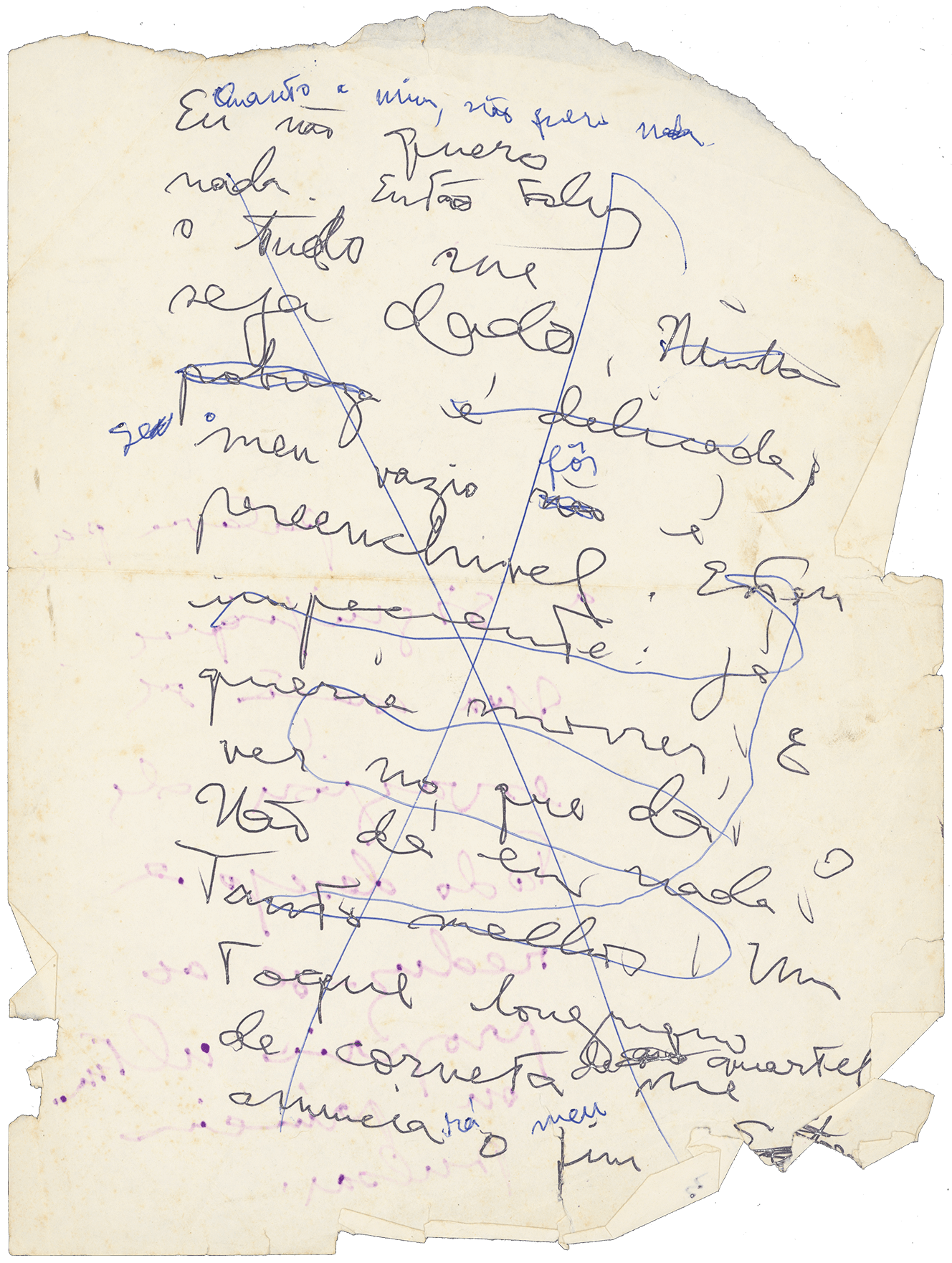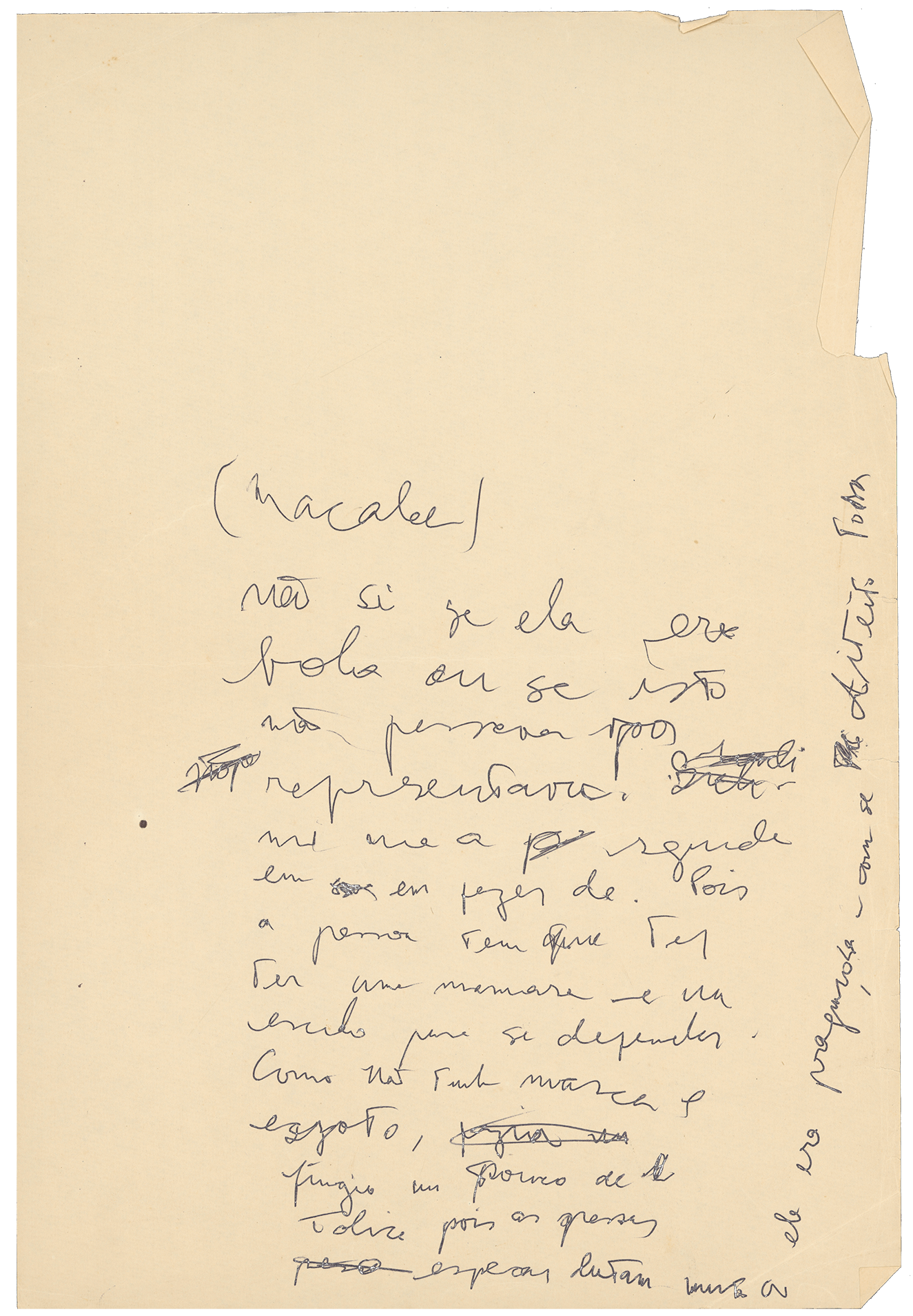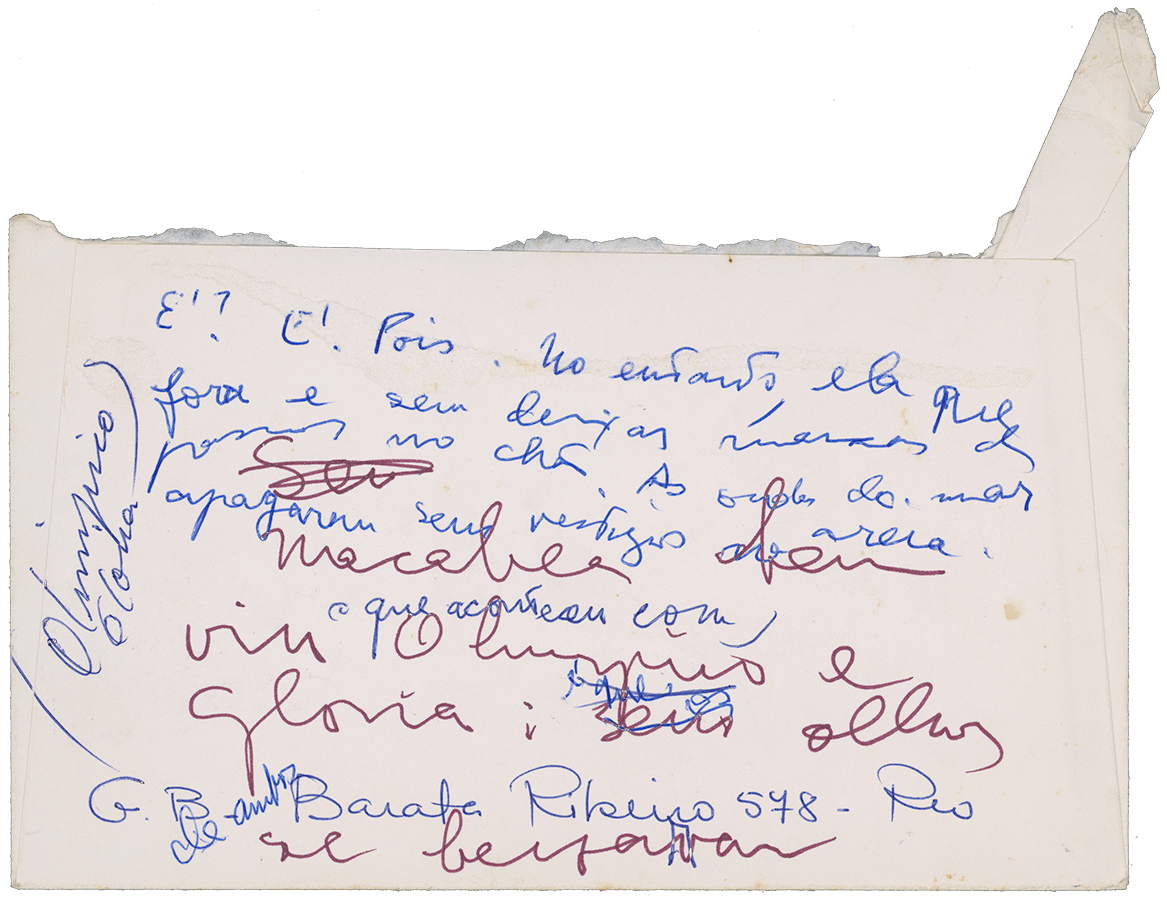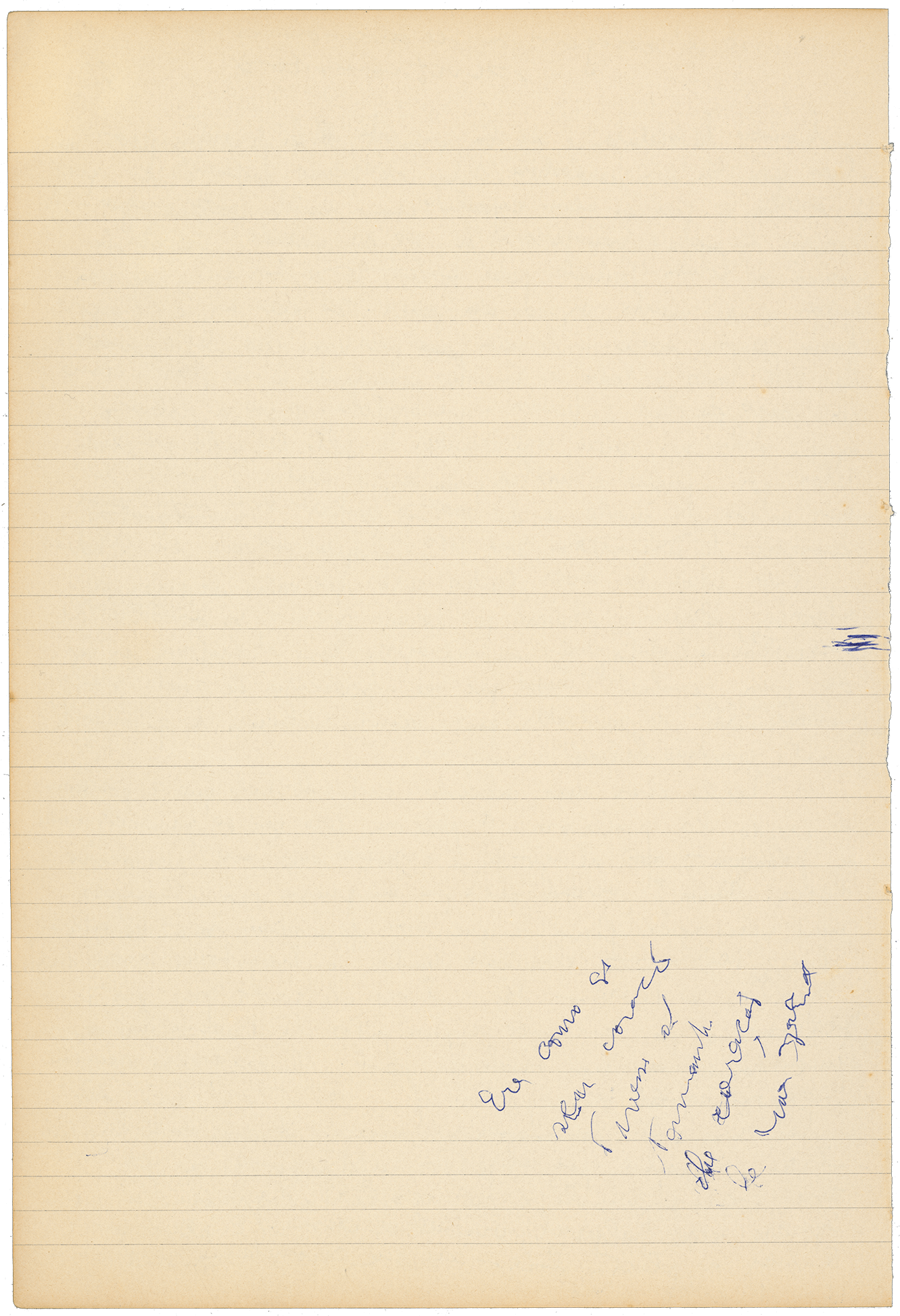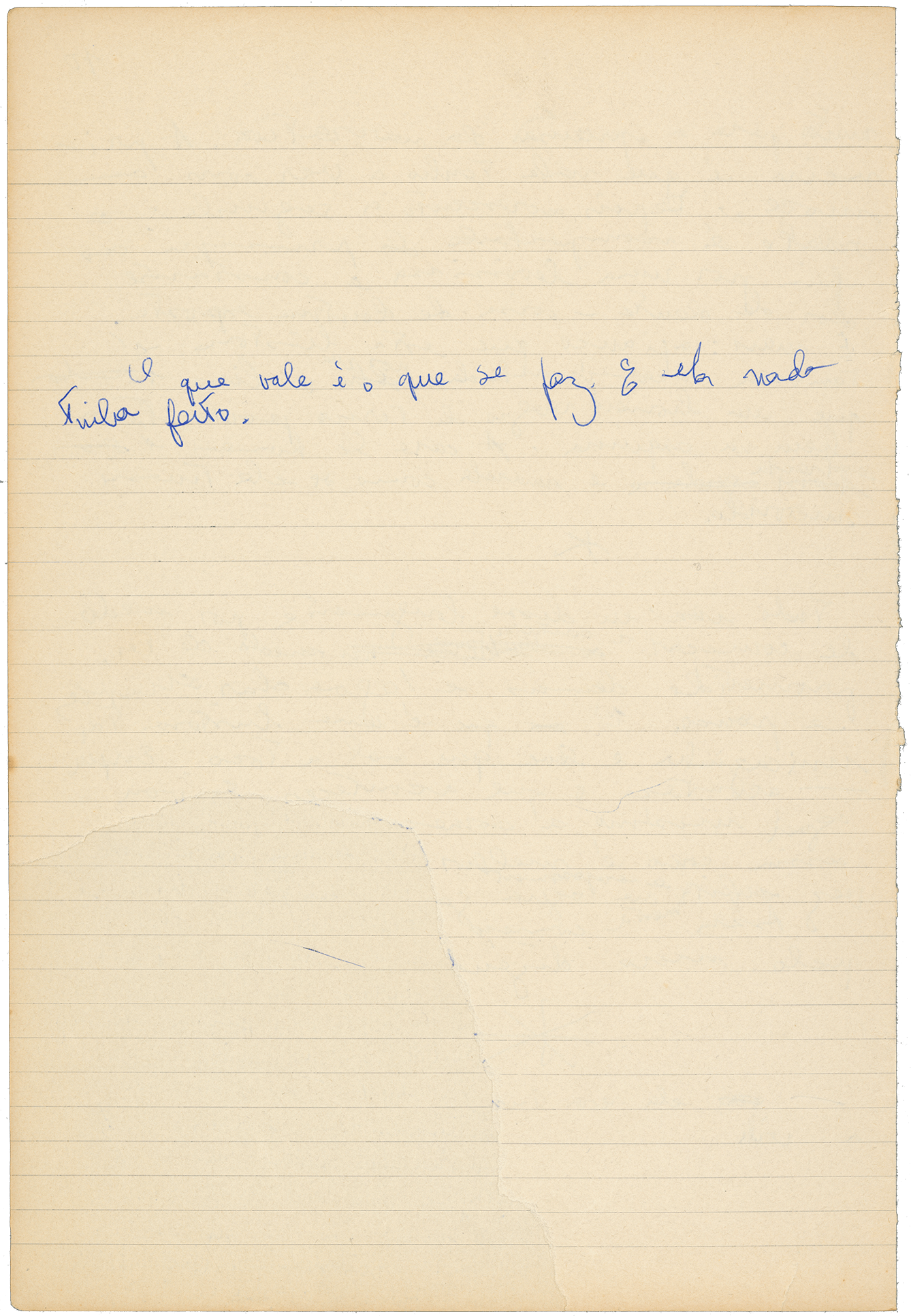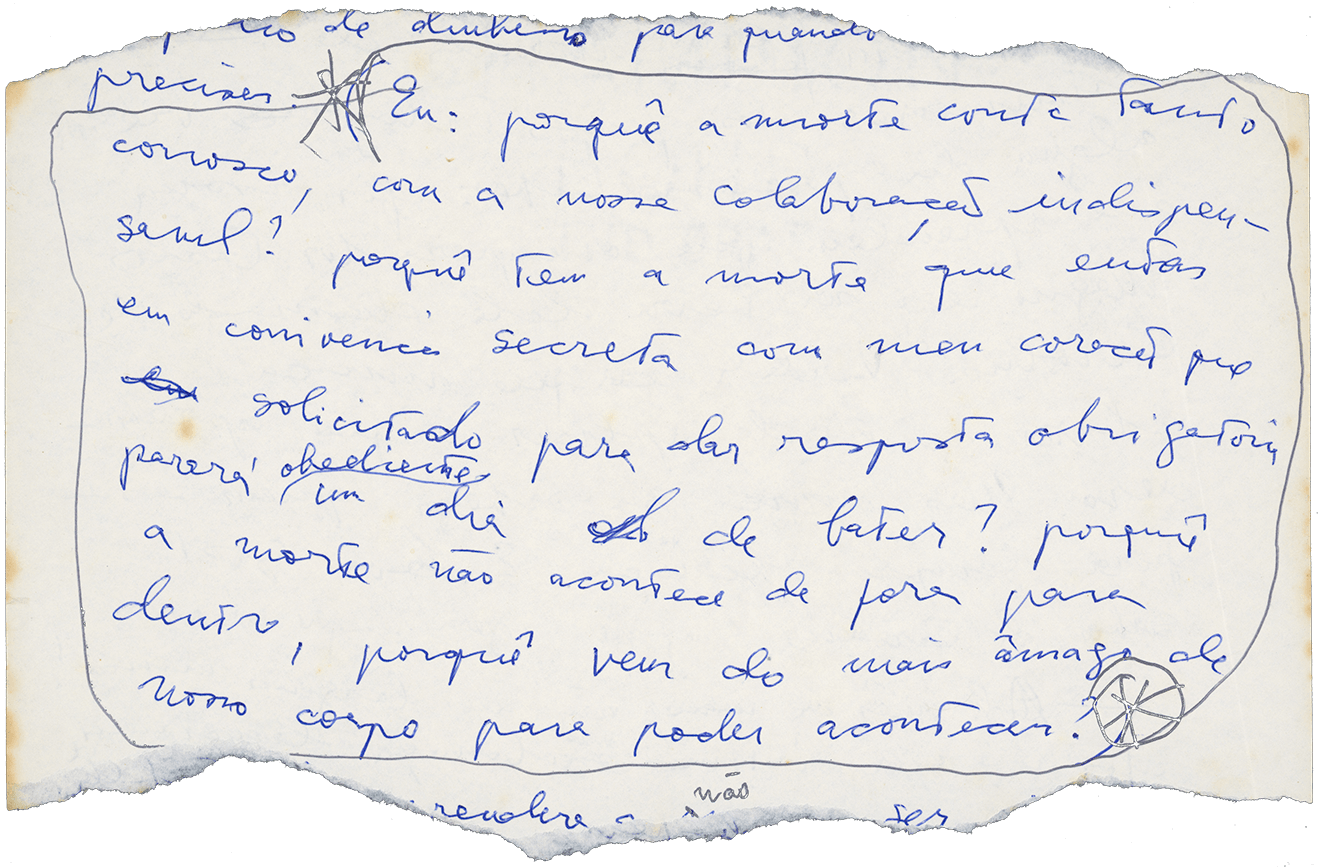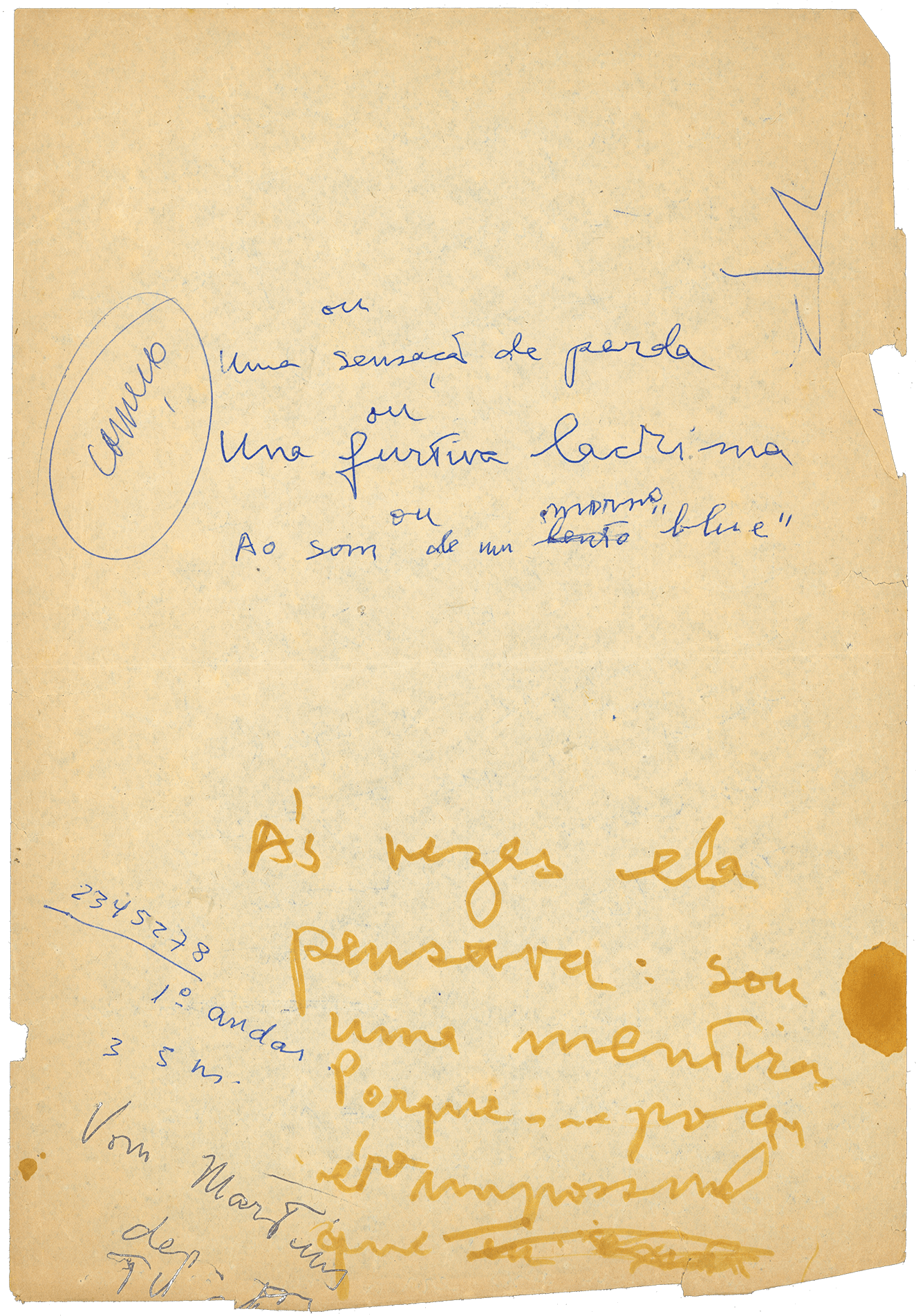
Note for the titles of The Hour of the Star*. The handwriting is by Clarice and by Olga Borelli (observation circled, on the left).
*All quotes taken from The Hour of the Star, translated by Benjamin Moser.
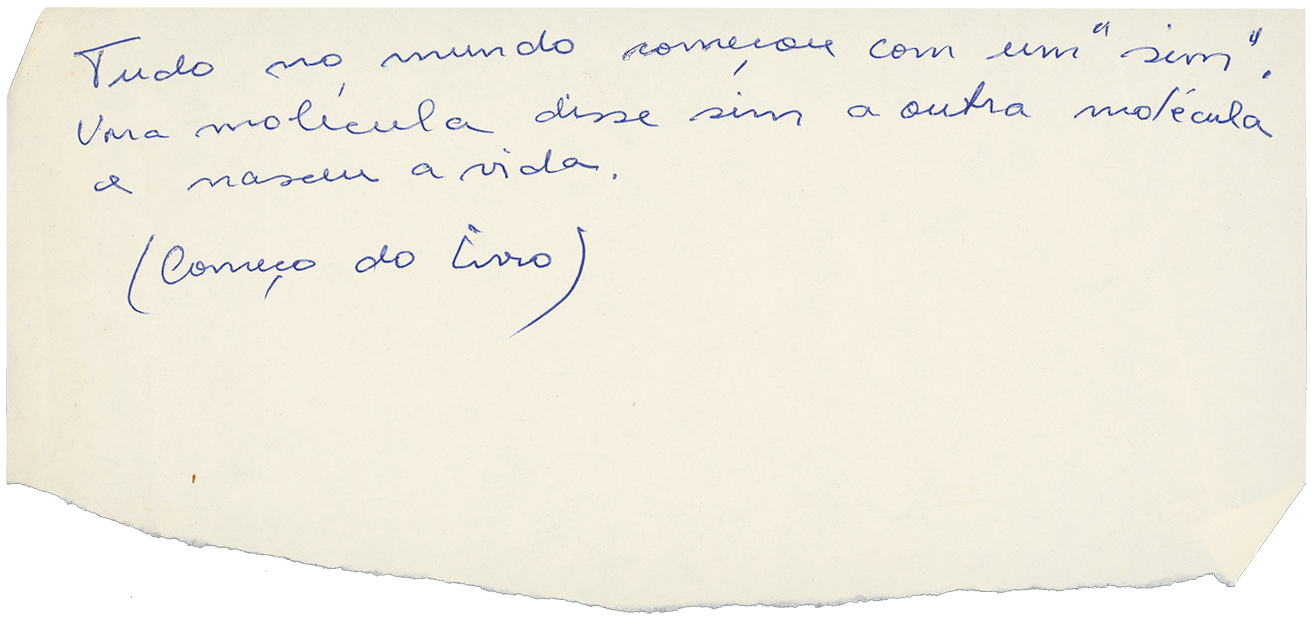
“Everything in the world began with a yes. One molecule said yes to another molecule and life was born. But before prehistory there was the prehistory of prehistory and there was the never and there was the yes. It was ever so. I do not know why, but I do know that the universe never began.”
Note used in the 1st paragraph of The Hour of the Star. The handwriting is by Olga Borelli.
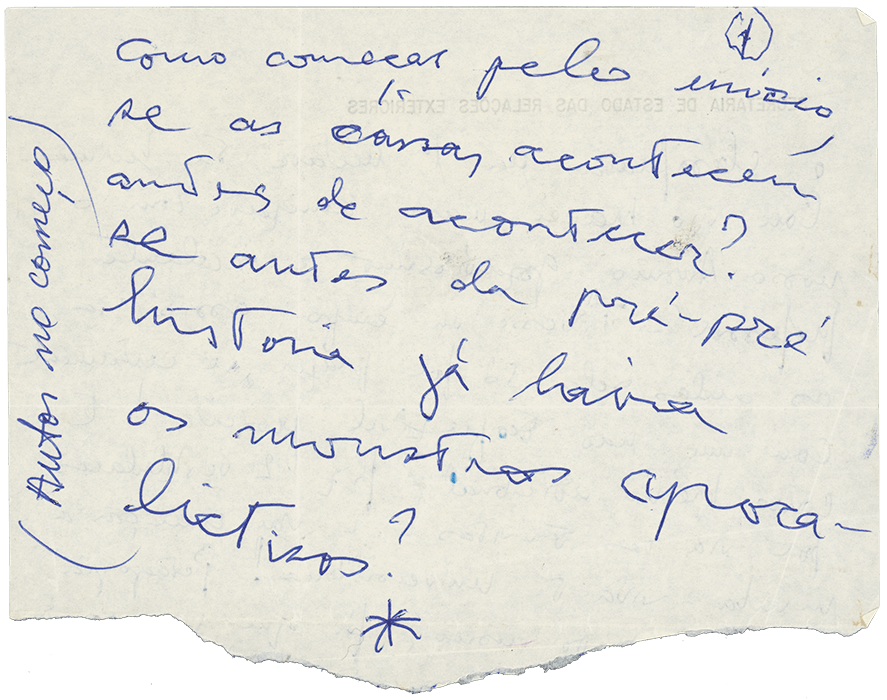
“So long as I have questions to which there are no answers, I shall go on writing. How does one start at the beginning, if things happen before they actually happen? If before the pre-prehistory there already existed apocalyptic monsters? If this history does not exist, it will come to exist. To think is an act. To feel is a fact. Put the two together—it is me who is writing what I am writing. God is the world. The truth is always some inner power without explanation. The more genuine part of my life is unrecognizable, extremely intimate and impossible to define. My heart has shed every desire and reduced itself to one final or initial beat. The toothache that passes through this narrative has given me a sharp twinge right in the mouth. I break out into a strident, high-pitched, syncopated melody. It is the sound of my own pain, of someone who carries this world where there is so little happiness. Happiness? I have never come across a more foolish word, invented by all those unfortunate girls from north-eastern Brazil.”
Note used in the 3rd paragraph of The Hour of the Star. The handwriting is by Clarice and by Olga Borelli (observation between parentheses, on the left).
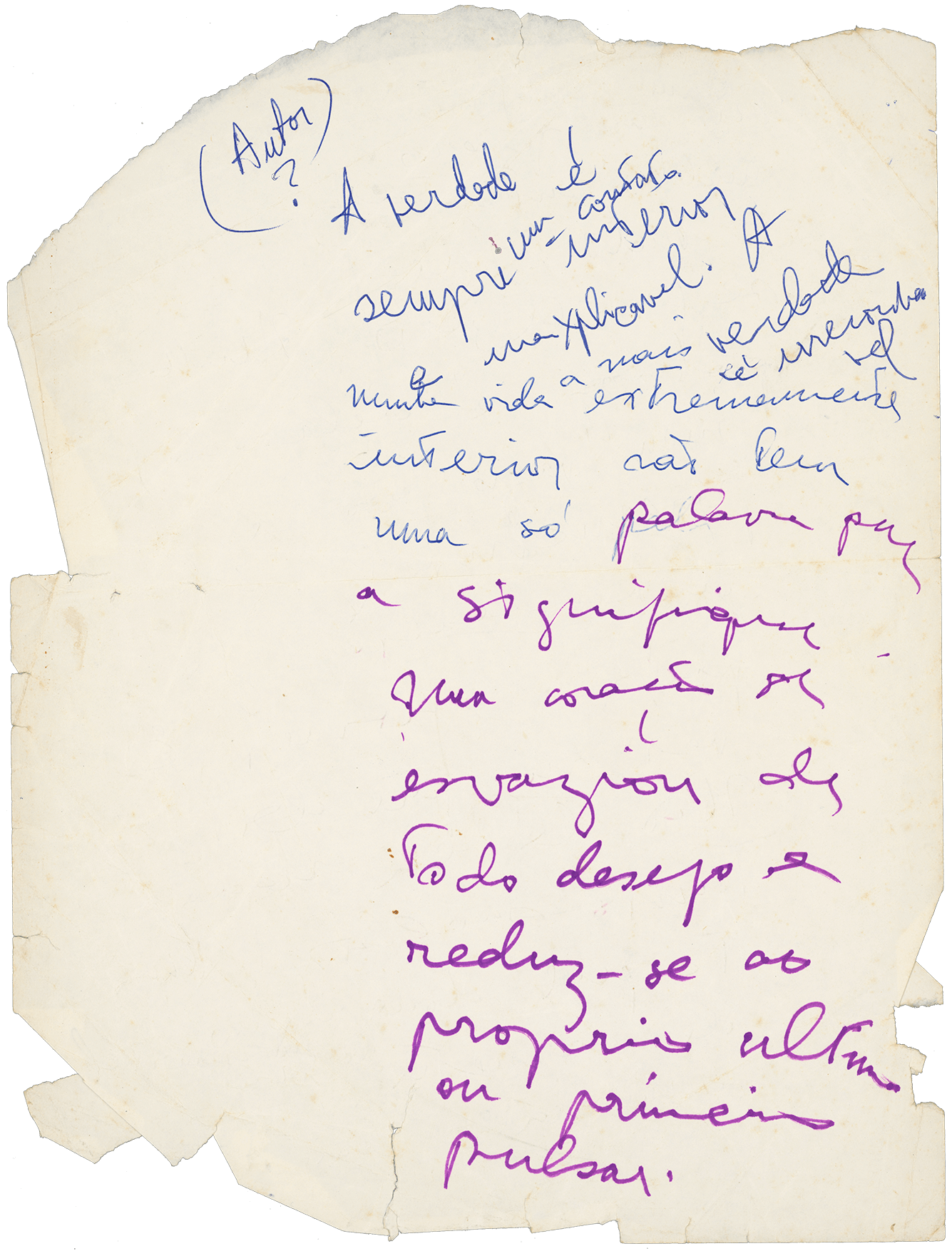
“So long as I have questions to which there are no answers, I shall go on writing. How does one start at the beginning, if things happen before they actually happen? If before the pre-prehistory there already existed apocalyptic monsters? If this history does not exist, it will come to exist. To think is an act. To feel is a fact. Put the two together—it is me who is writing what I am writing. God is the world. The truth is always some inner power without explanation. The more genuine part of my life is unrecognizable, extremely intimate and impossible to define. My heart has shed every desire and reduced itself to one final or initial beat. The toothache that passes through this narrative has given me a sharp twinge right in the mouth. I break out into a strident, high-pitched, syncopated melody. It is the sound of my own pain, of someone who carries this world where there is so little happiness. Happiness? I have never come across a more foolish word, invented by all those unfortunate girls from north-eastern Brazil.”
Note used in the 3rd paragraph of The Hour of the Star. The handwriting is by Clarice and by Olga Borelli (observation between parentheses, up high, on the left).
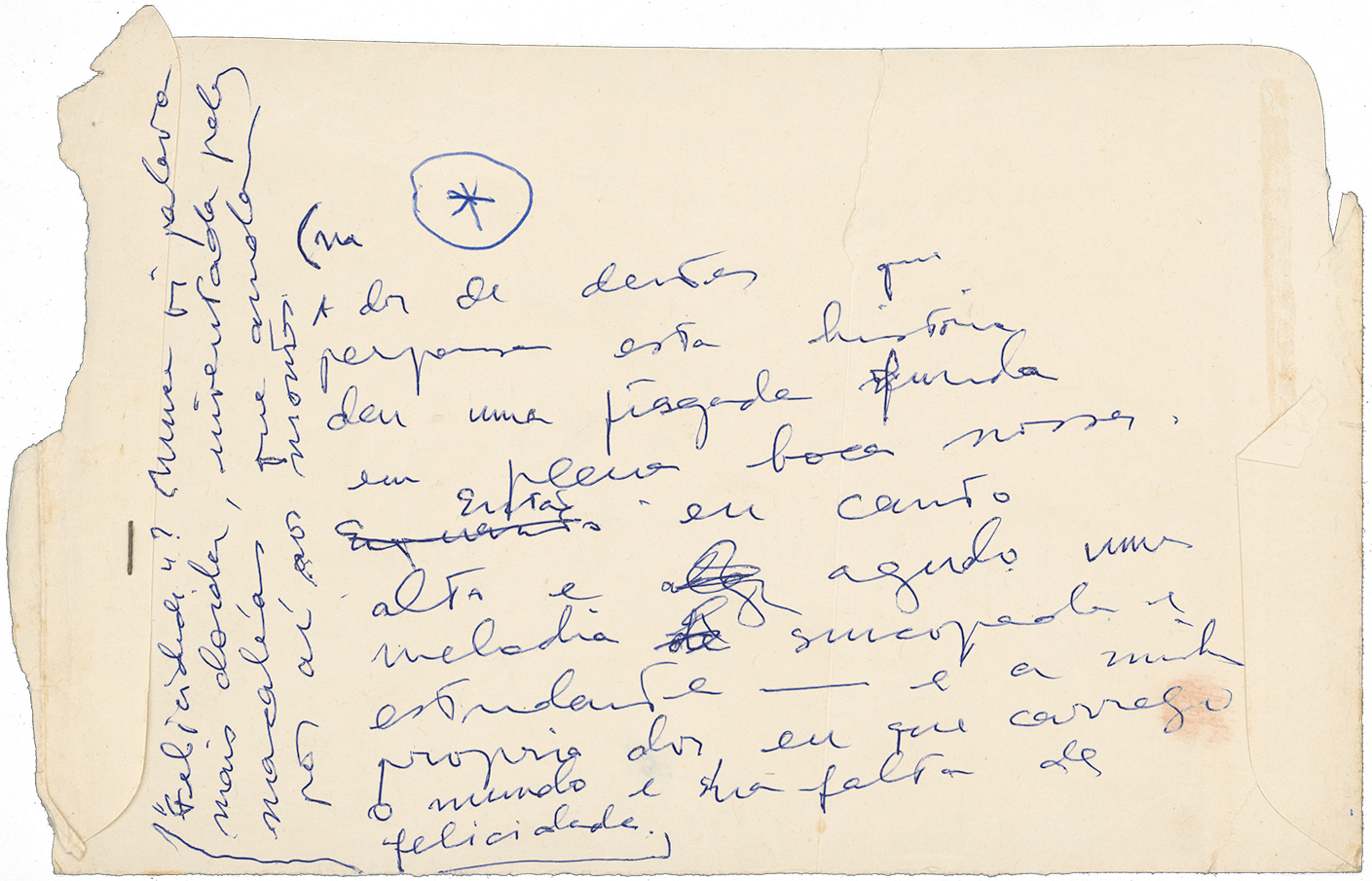
“So long as I have questions to which there are no answers, I shall go on writing. How does one start at the beginning, if things happen before they actually happen? If before the pre-prehistory there already existed apocalyptic monsters? If this history does not exist, it will come to exist. To think is an act. To feel is a fact. Put the two together—it is me who is writing what I am writing. God is the world. The truth is always some inner power without explanation. The more genuine part of my life is unrecognizable, extremely intimate and impossible to define. My heart has shed every desire and reduced itself to one final or initial beat. The toothache that passes through this narrative has given me a sharp twinge right in the mouth. I break out into a strident, high-pitched, syncopated melody. It is the sound of my own pain, of someone who carries this world where there is so little happiness. Happiness? I have never come across a more foolish word, invented by all those unfortunate girls from north-eastern Brazil.”
Note used in the 3rd paragraph of The Hour of the Star. The handwriting is by Clarice.
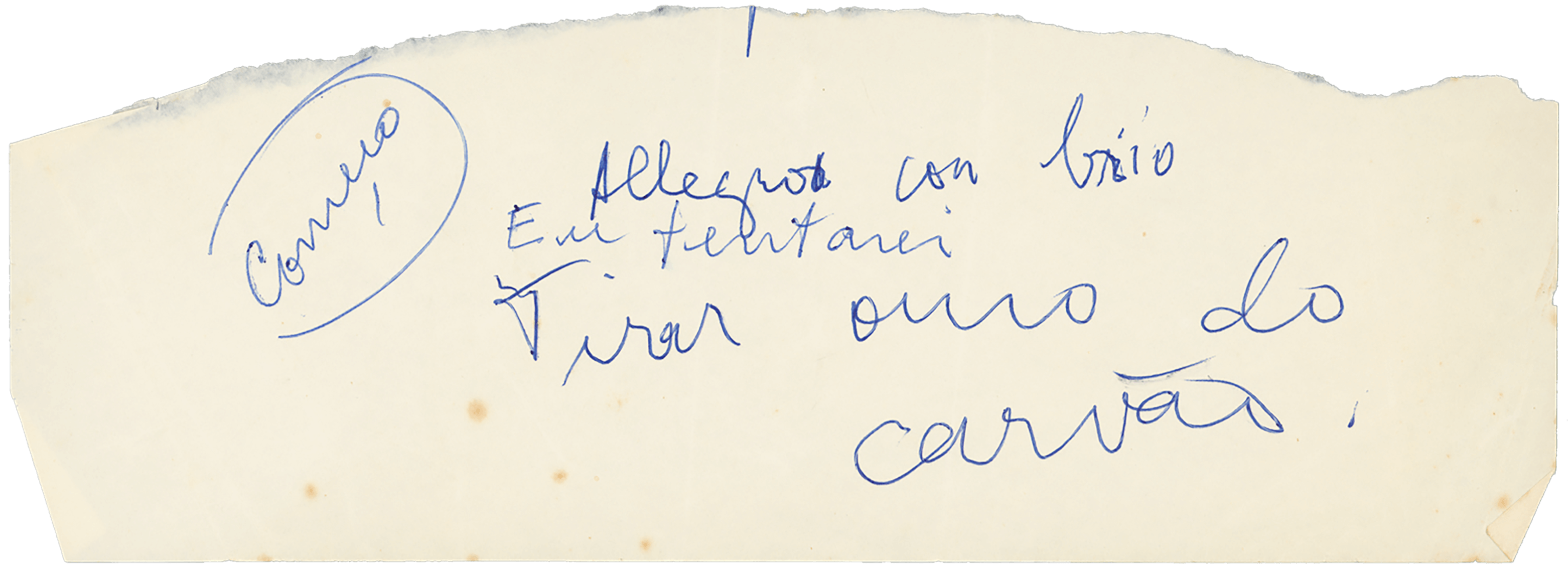
“In writing this story, I shall yield to emotion and I know perfectly well that every day is one more day stolen from death. In no sense an intellectual, I write with my body. And what I write is like a dank haze. The words are sounds transfused with shadows that intersect unevenly, stalactites, woven lace, transposed organ music. I can scarcely invoke the words to describe this pattern, vibrant and rich, morbid and obscure, its counterpoint the deep bass of sorrow. Allegro con brio. I shall attempt to extract gold from charcoal. I know that I am holding up the narrative and playing at ball without a ball. Is the fact an act? I swear that this book is composed without words: like a mute photograph. This book is a silence: an interrogation.”
Note used in the 21st paragraph of The Hour of the Star. The handwriting is by Clarice and by Olga Borelli (observation circled, on the left).
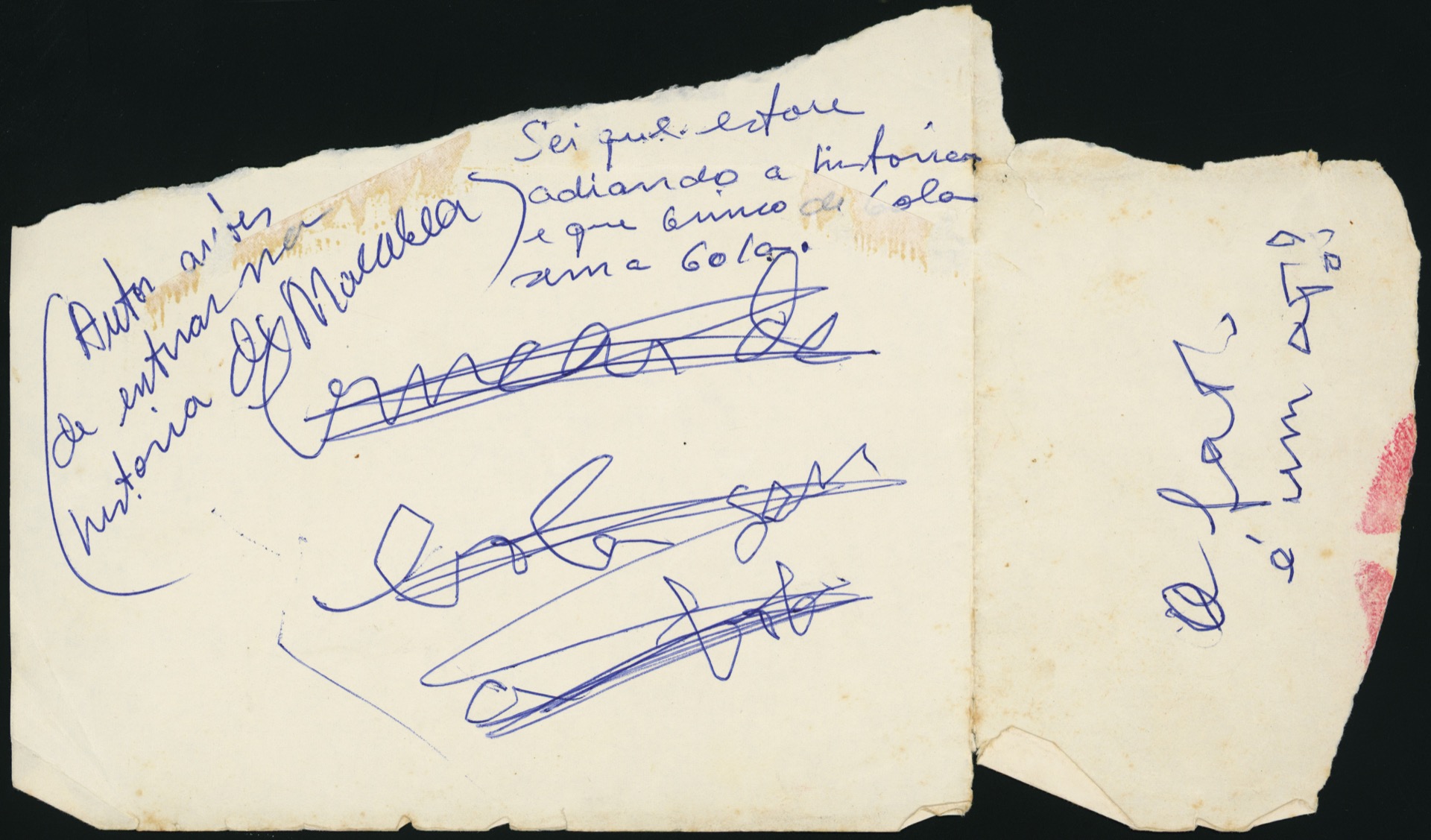
HEs05-003
“In writing this story, I shall yield to emotion and I know perfectly well that every day is one more day stolen from death. In no sense an intellectual, I write with my body. And what I write is like a dank haze. The words are sounds transfused with shadows that intersect unevenly, stalactites, woven lace, transposed organ music. I can scarcely invoke the words to describe this pattern, vibrant and rich, morbid and obscure, its counterpoint the deep bass of sorrow. Allegro con brio. I shall attempt to extract gold from charcoal. I know that I am holding up the narrative and playing at ball without a ball. Is the fact an act? I swear that this book is composed without words: like a mute photograph. This book is a silence: an interrogation.”
Note used in the 21st paragraph of The Hour of the Star. The handwriting is by Clarice and by Olga Borelli (observation between parentheses, on the left, and note beside it).
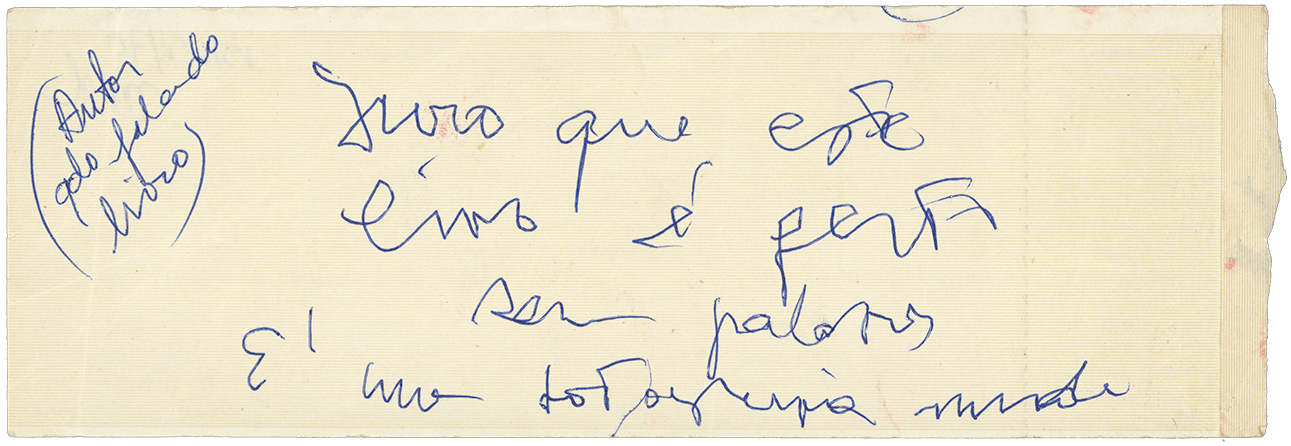
“In writing this story, I shall yield to emotion and I know perfectly well that every day is one more day stolen from death. In no sense an intellectual, I write with my body. And what I write is like a dank haze. The words are sounds transfused with shadows that intersect unevenly, stalactites, woven lace, transposed organ music. I can scarcely invoke the words to describe this pattern, vibrant and rich, morbid and obscure, its counterpoint the deep bass of sorrow. Allegro con brio. I shall attempt to extract gold from charcoal. I know that I am holding up the narrative and playing at ball without a ball. Is the fact an act? I swear that this book is composed without words: like a mute photograph. This book is a silence: an interrogation.”
Note used in the 21st paragraph of The Hour of the Star. The handwriting is by Clarice and by Olga Borelli (observation between parentheses, on the left).
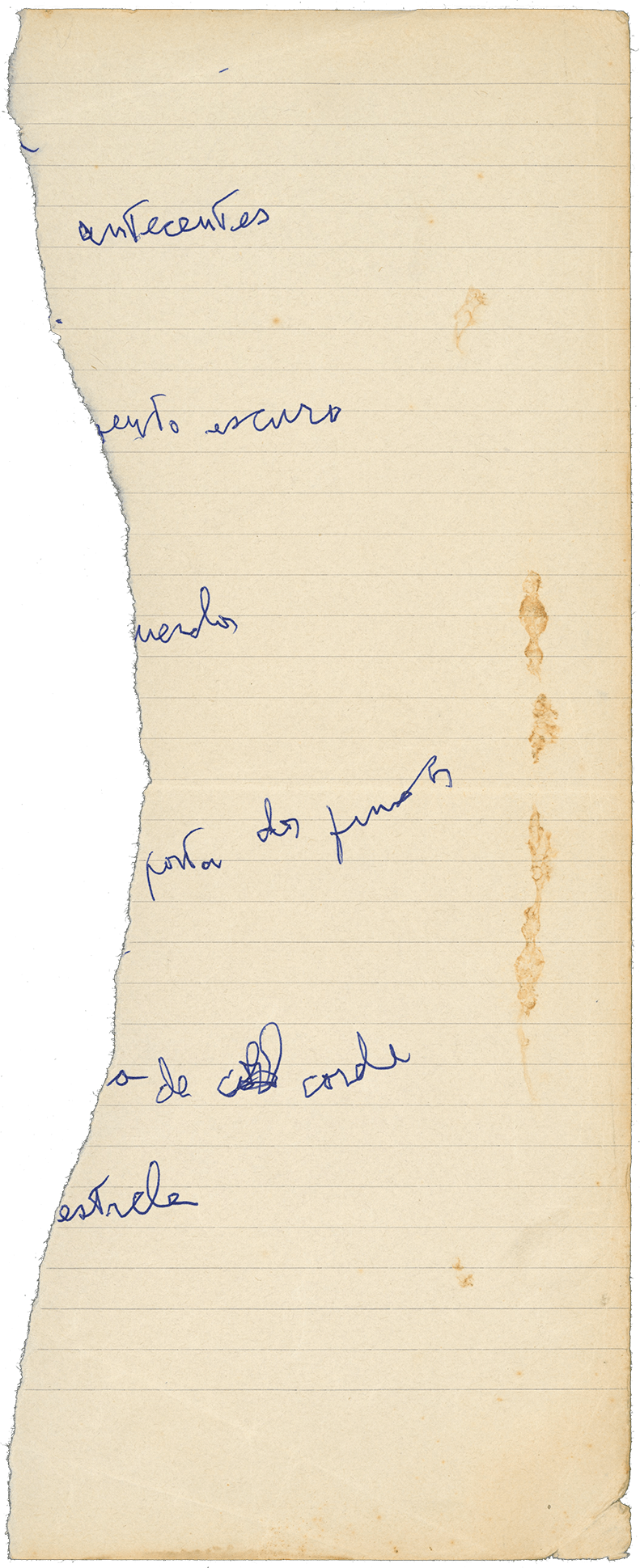
“I write because I have nothing better to do in this world: I am superfluous and last in the world of men. I write because I am desperate and weary. I can no longer bear the routine of my existence and, were it not for the constant novelty of writing, I should die symbolically each day. Yet I am prepared to leave quietly by the back door. I have experienced almost everything, even passion and despair. Now I only wish to possess what might have been but never was.”
Note used in the 40th paragraph of The Hour of the Star. The handwriting is by Clarice.
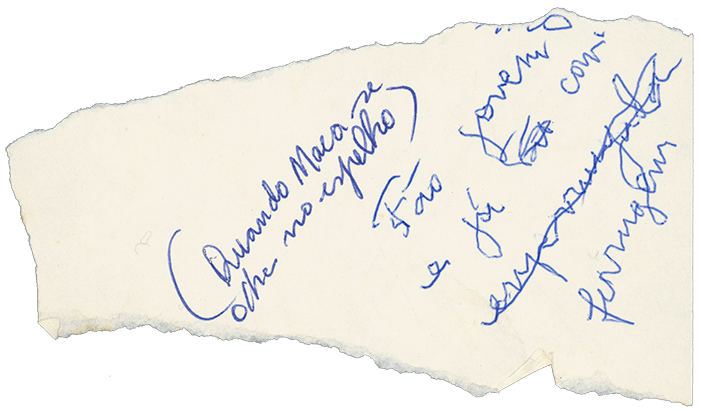
“After receiving this warning she went to the bathroom to be alone because she was all shaken. She mechanically looked at herself in the mirror atop the filthy and cracked sink, full of hairs, which matched her own life so well. It seemed to her that the dark and tarnished mirror didn’t reflect any image. Could her physical existence have vanished? This illusion immediately passed and she made out her face entirely distorted by cheap little mirror, her nose as huge as a clown’s papier-mâché nose. She looked at herself and lightly thought: so young and already so rusted.”
Note used in the 58th paragraph of The Hour of the Star. The handwriting is by Clarice and by Olga Borelli (observation between parentheses).
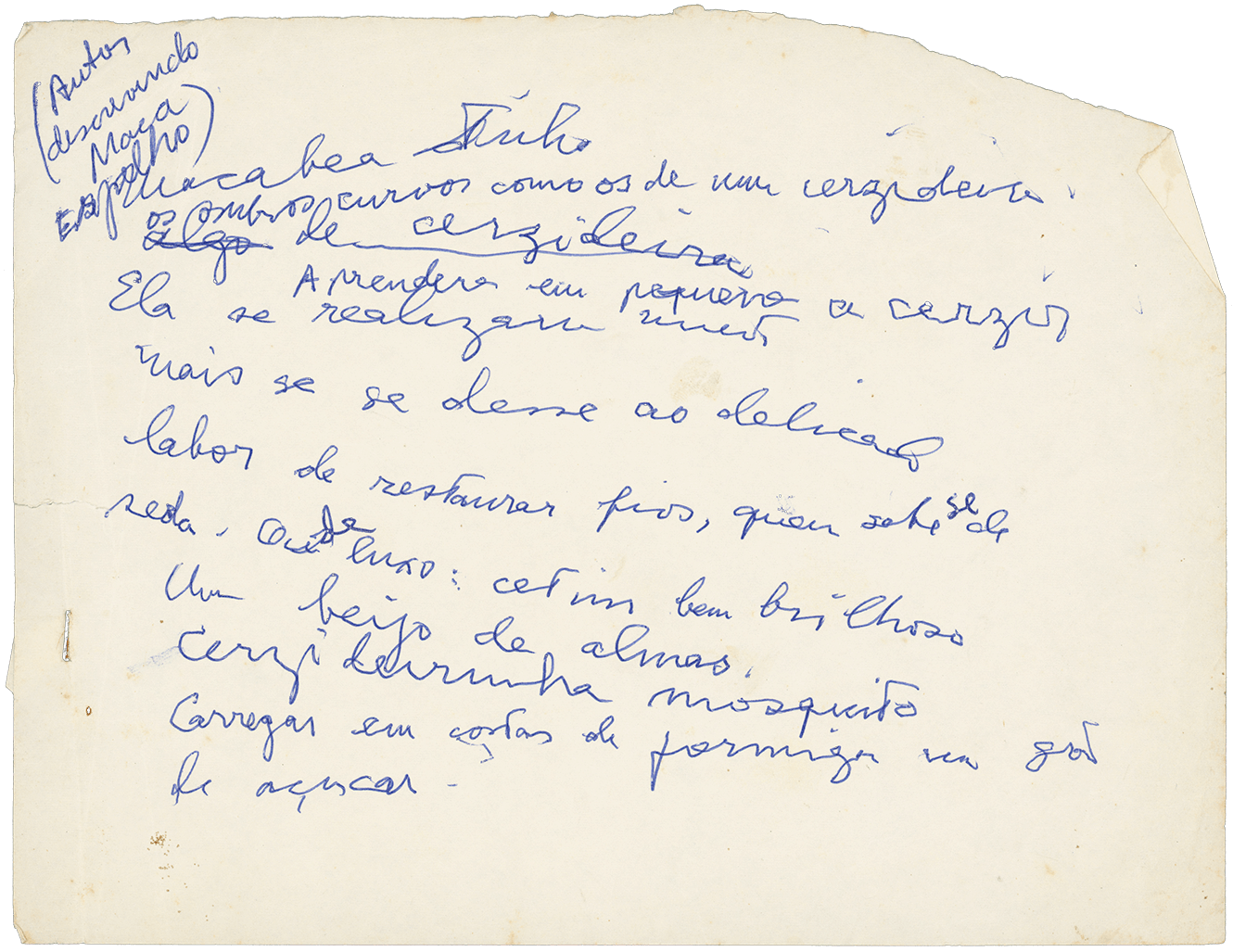
“The girl had slumped shoulders like those of a darning-woman. She’d learned to darn as a child. She might have come farther in life if she had devoted herself to the delicate task of mending, maybe even mending silk. Or luxurious fabrics: nice shiny satin, a kiss of souls. Little darning mosquito. A grain of sugar carried on an ant’s back. There was something slightly idiotic about her, but she wasn’t an idiot. She didn’t know she was unhappy. That’s because she believed. In what? In you, but you don’t have to believe in anyone or anything — you just have to believe. That sometimes gave her the state of grace. She’d never lost faith.”
Note used in the 61st paragraph of The Hour of the Star. The handwriting is by Clarice and by Olga Borelli (observation between parentheses, up high, on the left).
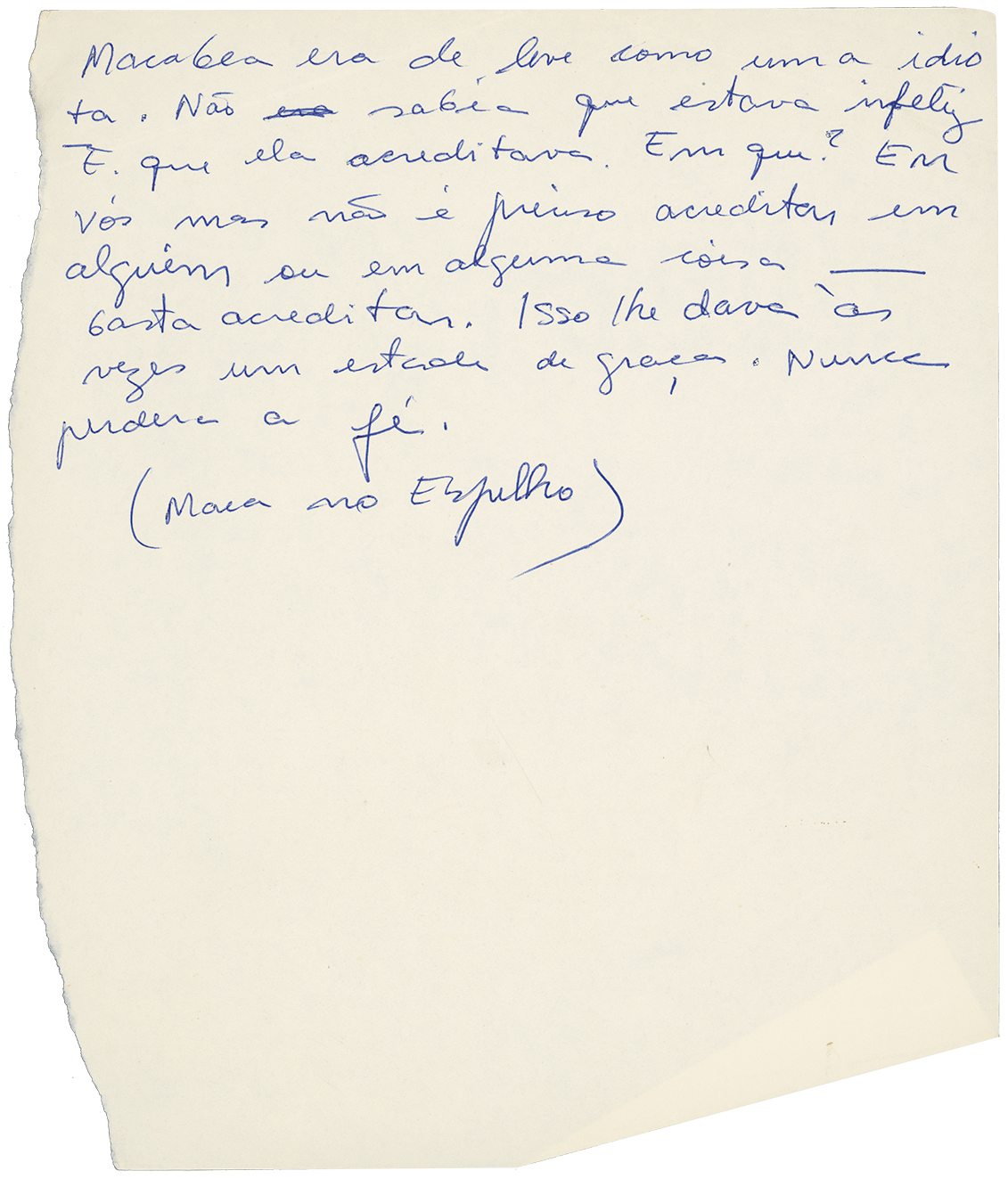
“The girl had slumped shoulders like those of a darning-woman. She’d learned to darn as a child. She might have come farther in life if she had devoted herself to the delicate task of mending, maybe even mending silk. Or luxurious fabrics: nice shiny satin, a kiss of souls. Little darning mosquito. A grain of sugar carried on an ant’s back. There was something slightly idiotic about her, but she wasn’t an idiot. She didn’t know she was unhappy. That’s because she believed. In what? In you, but you don’t have to believe in anyone or anything — you just have to believe. That sometimes gave her the state of grace. She’d never lost faith.”
Note used in the 61st paragraph of The Hour of the Star. The handwriting is by Olga Borelli.
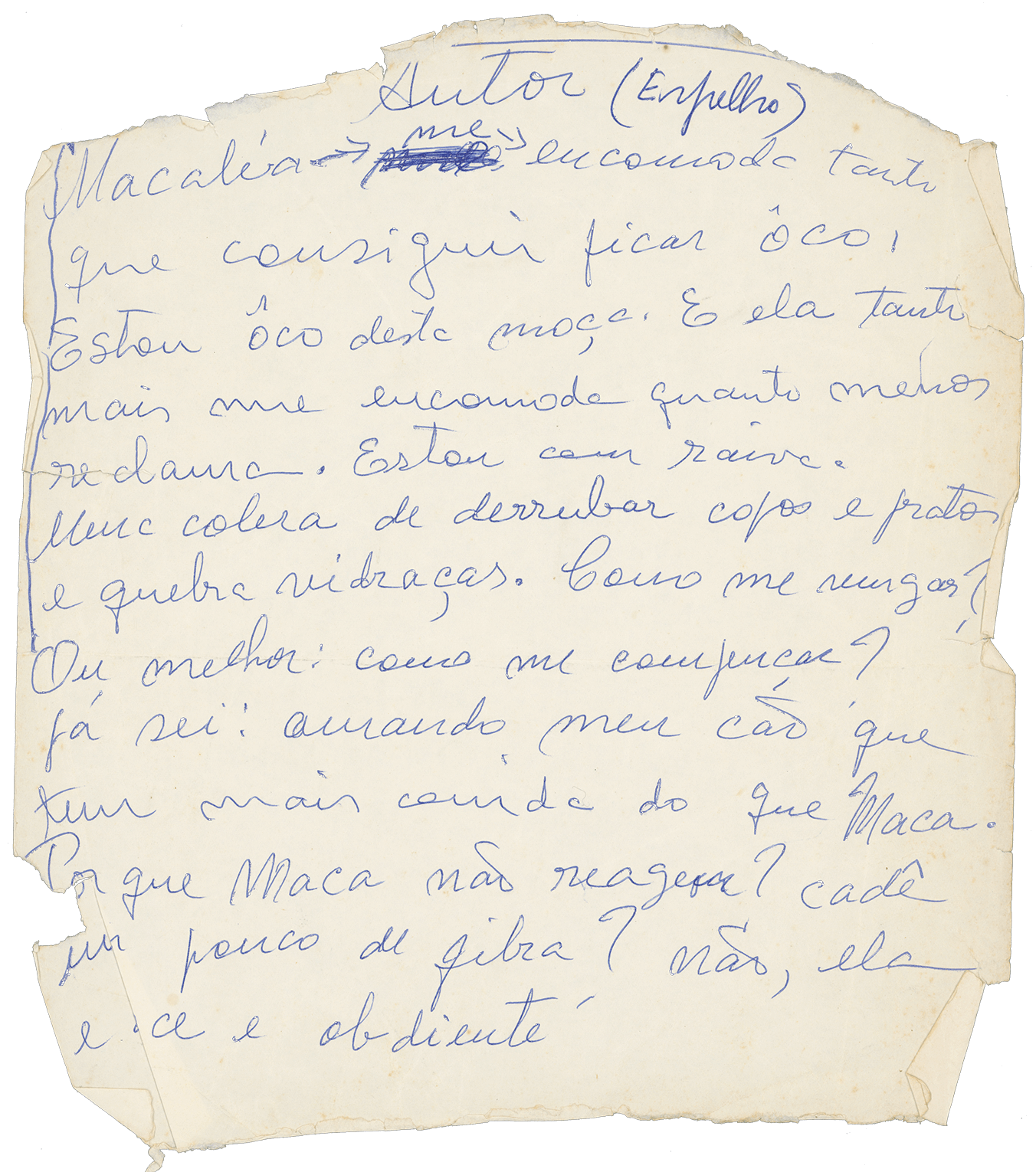
“(She makes me so uncomfortable that I feel hollow. I’m hollow of that girl. And the more uncomfortable she makes me the less she demands. I’m angry. So enraged I could smash cups and dishes and break windows. How can I avenge myself? Or rather, how can I make up for it? I’ve got it: by loving my dog who has more food than that girl. Why doesn’t she react? Can’t she grow a backbone? No, she is sweet and obedient.)”
Note used in the 62nd paragraph of The Hour of the Star. The handwriting is by Olga Borelli.
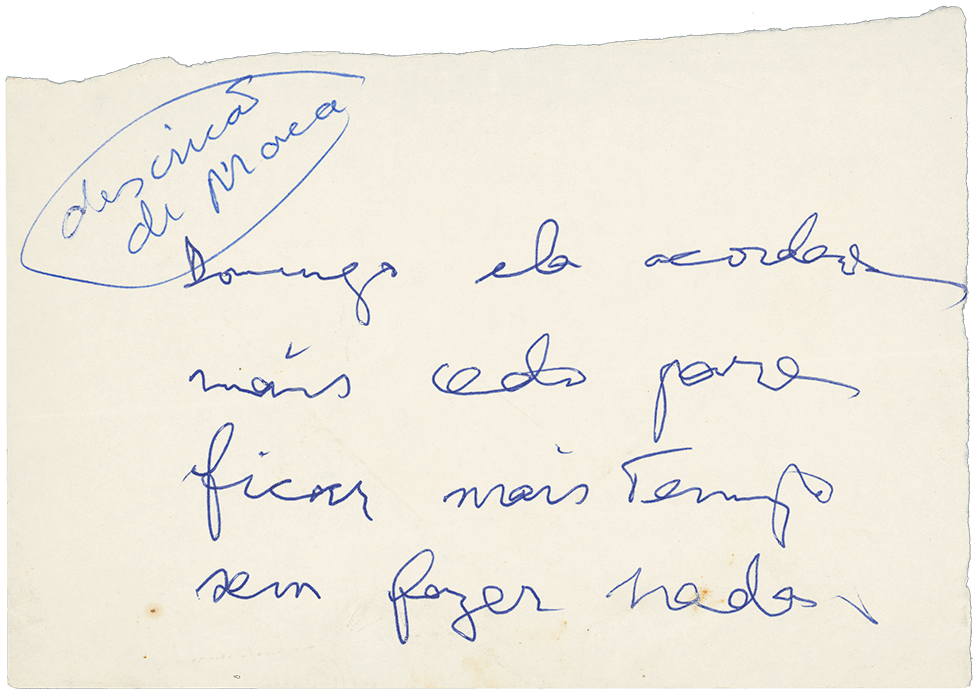
“On Sundays she got up early in order to have more time to do nothing.”
Note used in the 91st paragraph of The Hour of the Star. The handwriting is by Clarice and by Olga Borelli (observation circled, up high, on the left).
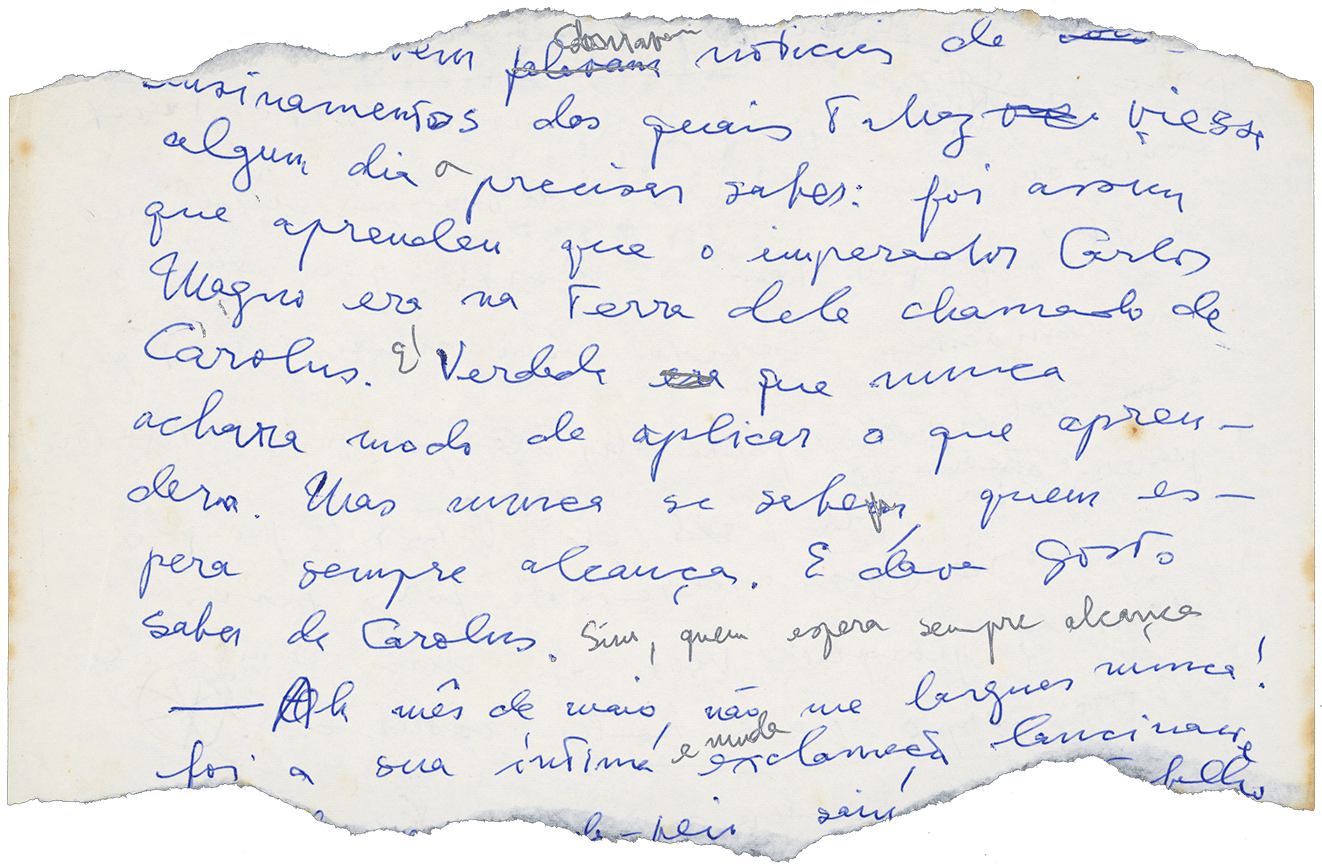
“Every morning she turned on the radio lent by one of her roommates, Maria da Penha, turning it on as low as possible so as to not disturb the others, turning it on to Clock Radio, which broadcast ‘the right time and culture,’ and no music, just dripping in sound of falling drops — each drop a minute that passed. And especially this station used those drops of minutes to run ads — she loved ads. It was the perfect station because also amongst the drops of time it gave short teachings about things she might one day need to know. That’s how she learned that the Emperor Charlemagne was called Carolus in his own land. Admittedly she never found any use for this information. But you never know, patience always patience always pays off in the end. She’d also heard that the only animal that doesn’t mate with its own offspring is the horse.”
Note used in the 102nd paragraph of The Hour of the Star. The handwriting is by Clarice.

“Since she didn’t want to rest her back for a day? She knew that if she said this to her boss he wouldn’t believe her ribs hurt. So she used a lie that was more convincing than truth: she said to her boss that she couldn’t work the next day because having a tooth pulled was very dangerous. And the lie worked. Sometimes only a lie can save you. So, the next day, when the four tired Marias went to work, she had for the first time in her life the most precious thing of all: solitude. She had a room all to herself. She could hardly believe that all this space was hers. And not a word was heard. So she danced in an act of absolute courage, since her aunt couldn’t hear her. She danced and twirled because being alone made her: f-r-e-e! She enjoyed everything, of this arduously obtained solitude, the radio as loud as it would go, the vastness of the room without the Marias. She got, as a favor, a little instant coffee from the landlady, and, as another favor, she asked her for some boiling water, drank it all licking herself and in front of the mirror so as not to miss any of herself. The encounter with herself was a good she had not yet known. I don’t think I’ve ever been so happy in my entire life, she thought. She owed nothing to anyone and no one owed her a thing. She even allowed herself the luxury of boredom — a quite unusual boredom.”
Note used in the 117th paragraph of The Hour of the Star. The handwriting is by Clarice.
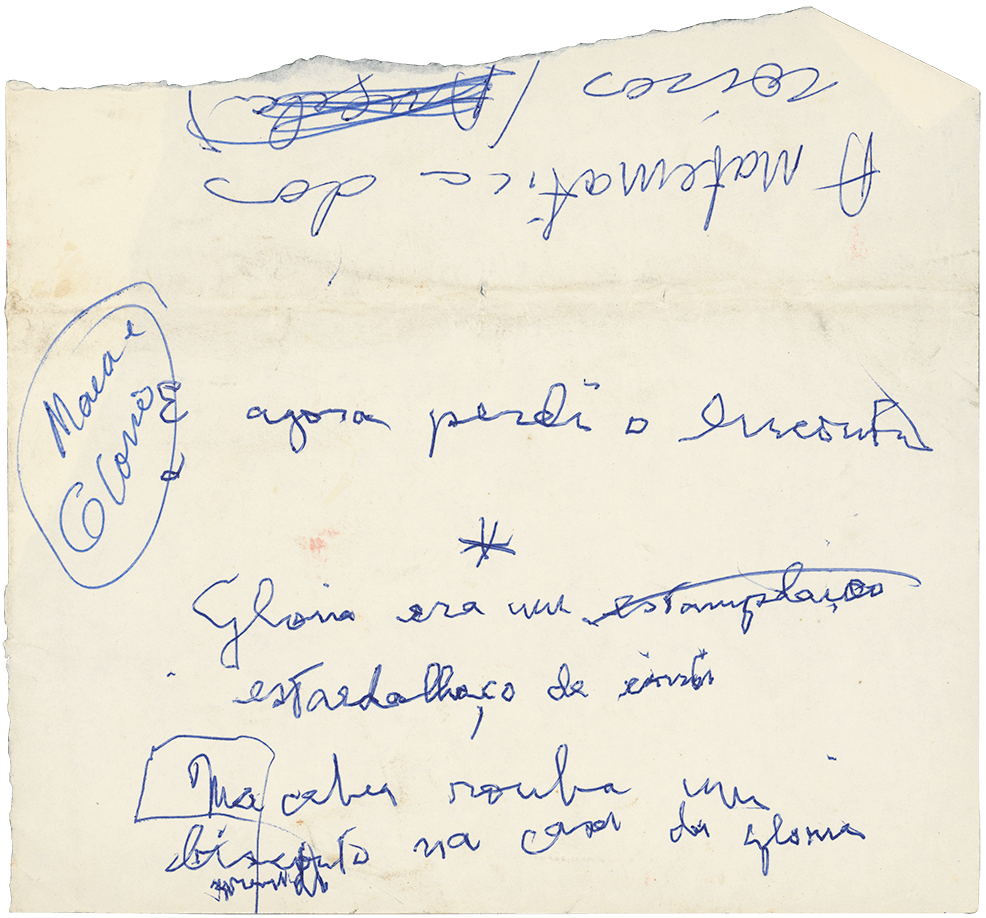
“Macabéa understood one thing: Glória was a fanfare of existence. And it must have been all because Glória was fat. Fat had always been Macabea’s secret ideal, since in Maceio she’d heard a guy say to a fat girl walking down the street: ‘your flesh is fresh!” From then on she’d aspired to fleshiness and that was when she made the only request of her life. She asked her aunt to buy her cod liver oil. (Even then she had a thing for ads.) Her aunt asked her: you think you’re some rich man’s daughter wanting luxuries?”
Note used in the 315th paragraph of The Hour of the Star. The handwriting is by Clarice and by Olga Borelli (observation circled, on the left).
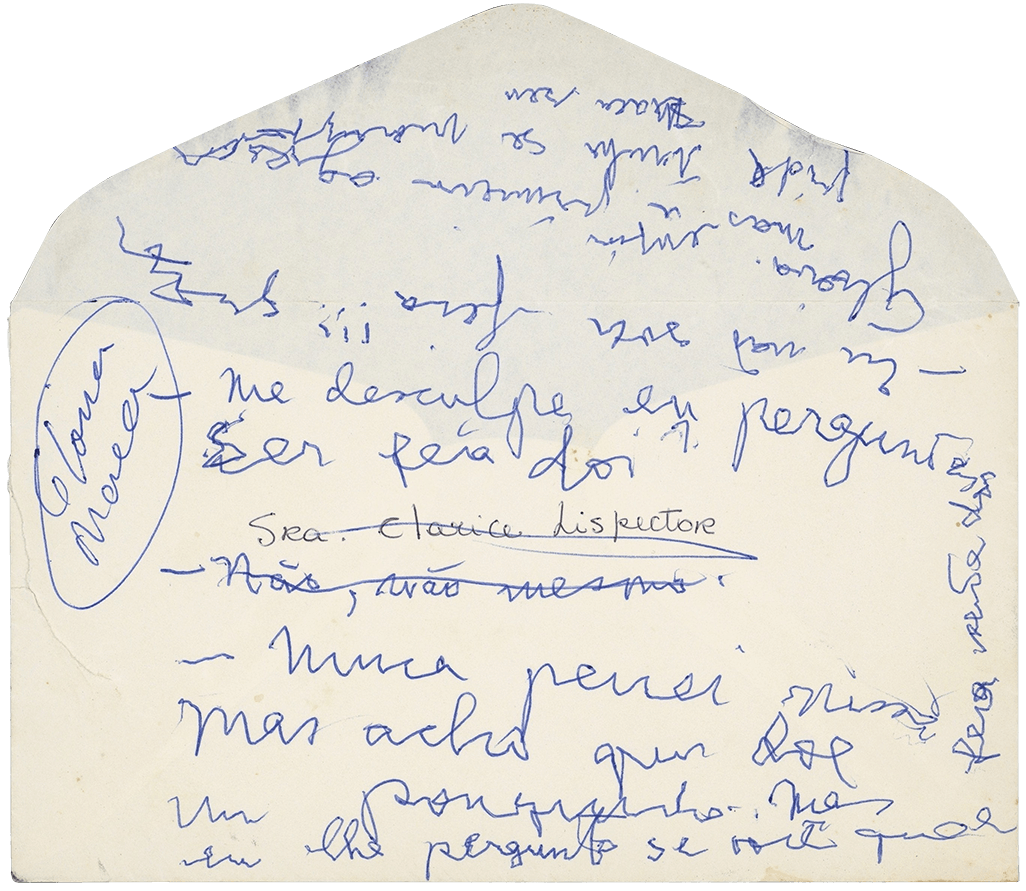
“— Sorry for asking: does being ugly hurt?
— I never thought about it, I think it hurts a little. But I should ask you if you hurt because you’re ugly.
— I’m not ugly!!! — Glória howled.”
Note used in the 320th, 321st, and 322nd paragraphs of The Hour of the Star. The handwriting is by Clarice and by Olga Borelli (observation circled, on the left).
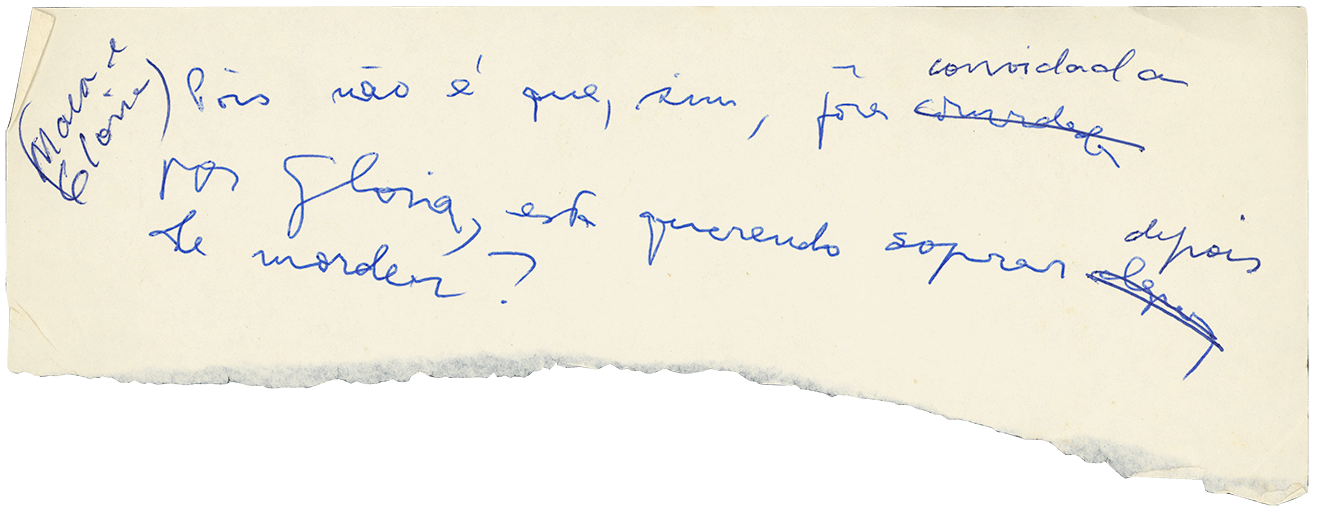
“Glória, wanting to make up for stealing the other girl’s boyfriend, invited her for a snack one afternoon, Sunday, at her house. To treat the wound she herself had inflicted? (Ah what a boring story, I can hardly stand writing it.)”
Note used in the 348th paragraph of The Hour of the Star. The handwriting is by Clarice and by Olga Borelli (observation between parentheses, on the left).
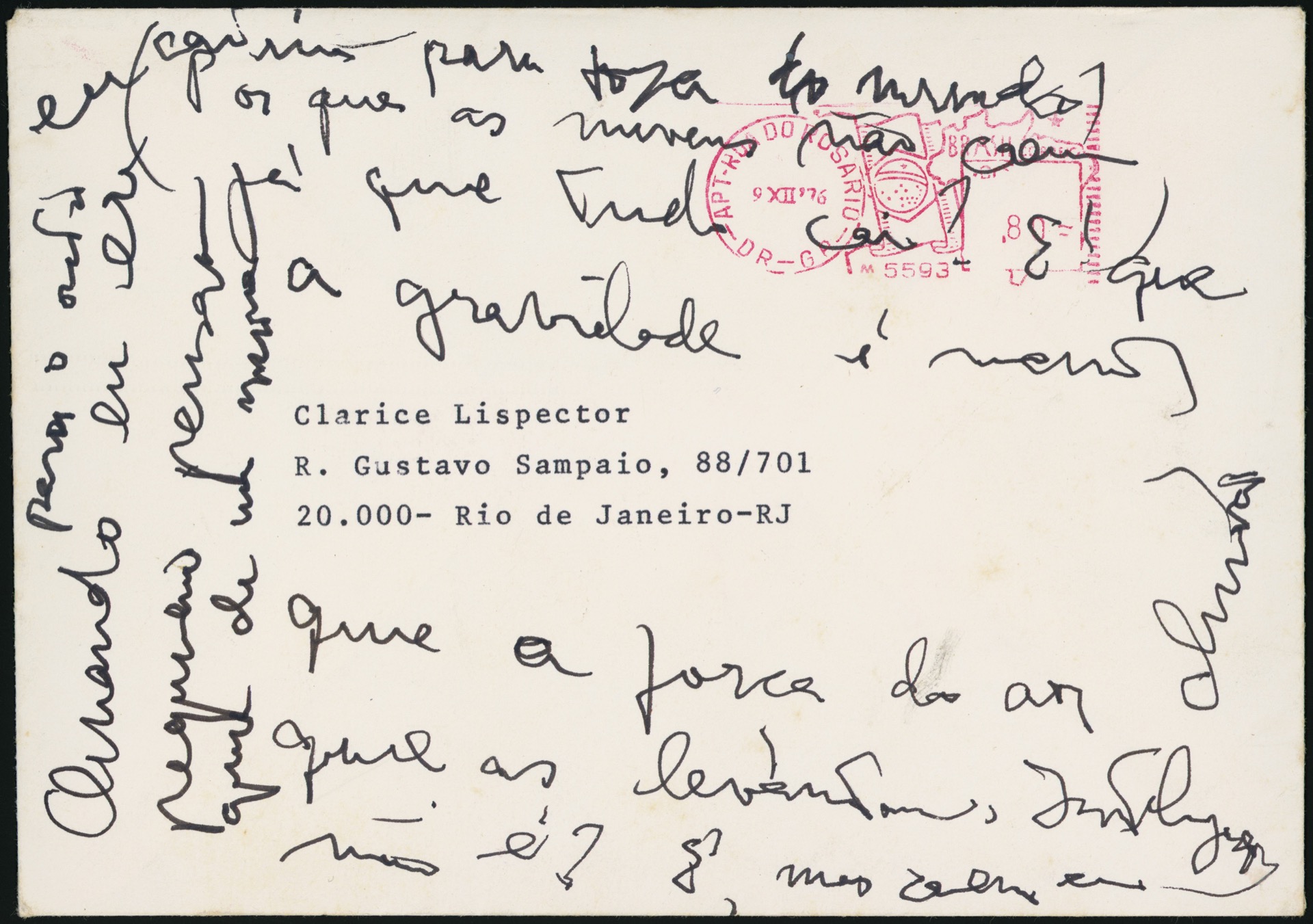
HEs05-006
“As for me, I’m only truthful when I’m alone. When I was a little boy I thought that from one minute to the next I could fall off the face of the earth. Why don’t clouds Why don’t clouds fall, since everything else does? Because gravity is less than the strength of the air that keeps them up there. Clever, right? Yes, but one day they fall as rain. That is my revenge.”
Note used in the 382nd paragraph of The Hour of the Star. The handwriting is by Clarice.

“In the sudden gush (explosion) of a vivid impulse Macabéa, half ferocious, half clumsy, planted a cracking kiss on Madame Carlota’s cheek. And she felt again that her life was already getting better, right then and there: because it was good to kiss. When she was little, since she didn’t have anyone to kiss, she’d kissed the wall. When she caressed someone else she was caressing herself.”
Note used in the 447th paragraph of The Hour of the Star. The handwriting is by Olga Borelli.

“You could tell perfectly that she was alive from the constant blinking of her big eyes, from the thin chest that was rising and falling in perhaps difficult breathing. But who can tell if she wasn’t needing to die? Because there are times when a person needs a little bitty death and doesn’t even know it. As for me, I substitute the act of death for a symbol of it. A symbol that can be summed up in a deep kiss but not on a rough wall but mouth-to-mouth in the agony of pleasure that is death. I, who symbolically die several times just to experience the resurrection.”
Note used in the 470th paragraph of The Hour of the Star. The handwriting is by Clarice.
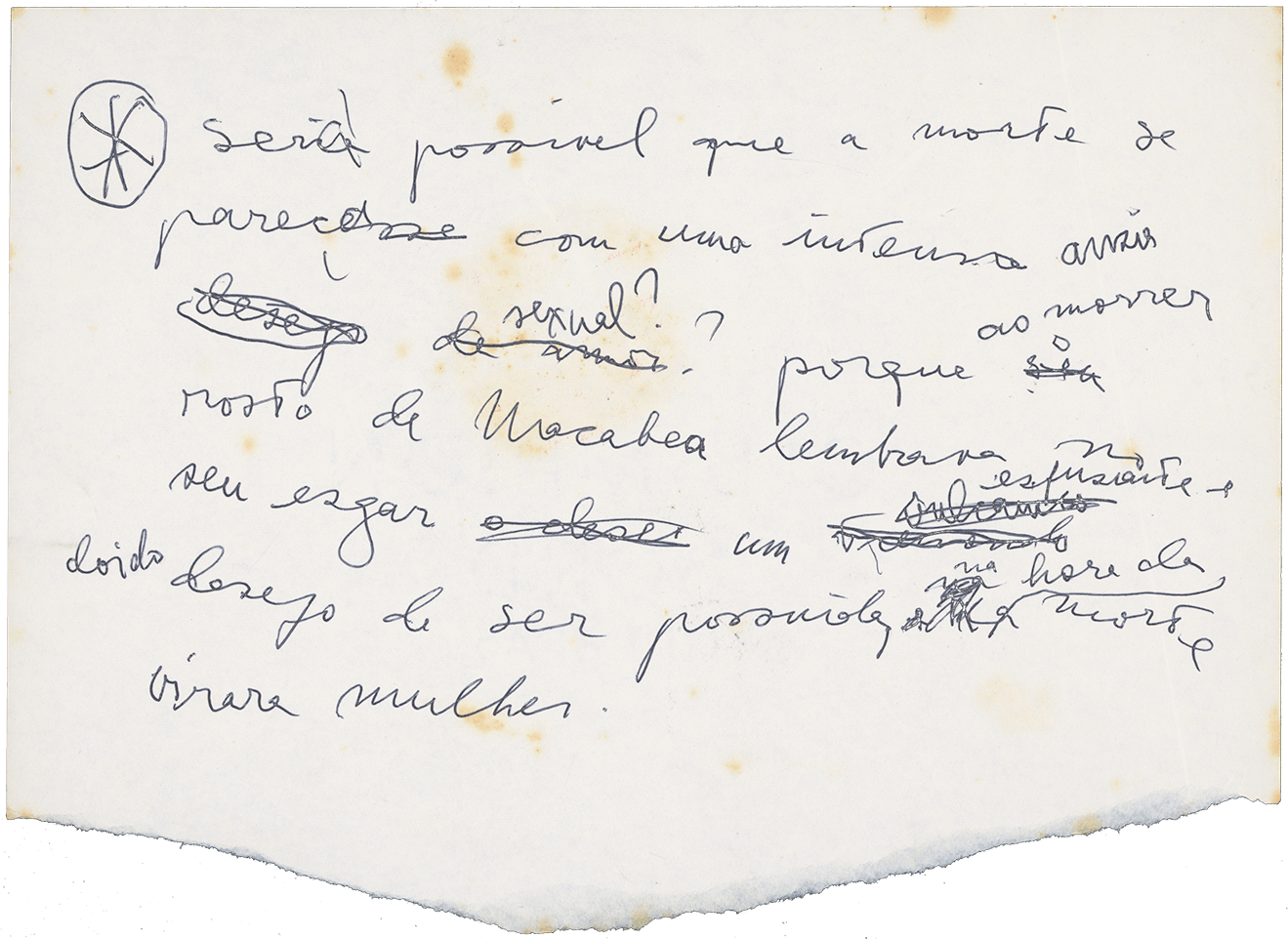
“Then — lying there — she had a moist and supreme happiness, since she had been born for the embrace of death. Death which is my favorite character in this story. Was she going to say farewell to herself? I don’t think she is going to die because she wants to live so much. And there was a certain sensuality in the way she’d huddled up. Or is it because pre-death resembles intense sensual throes? Because her face looked like a grimace of desire. Things are always days before and if she doesn’t die she is like us on the day before her death, forgive me for reminding you because as for me I can’t forgive my clairvoyance.”
Note used in the 474th paragraph of The Hour of the Star. The handwriting is by Clarice.
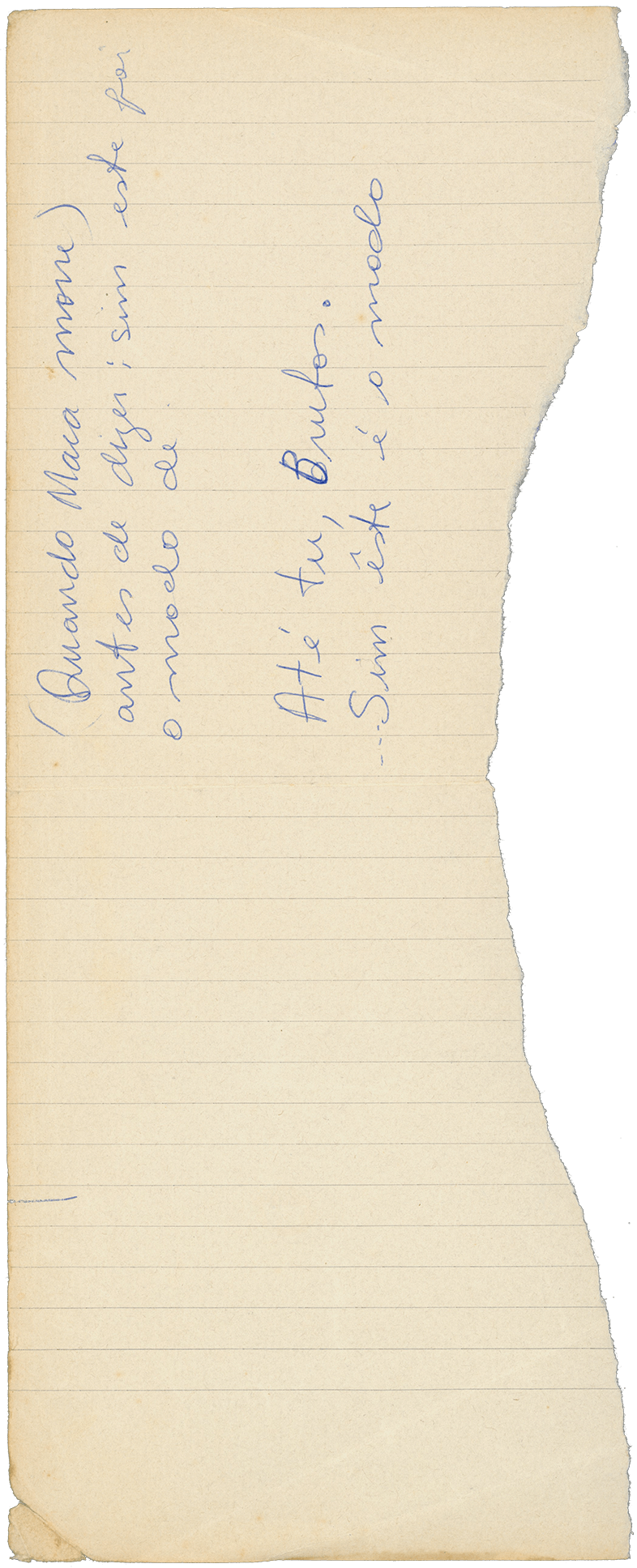
“Et tu, Brute?! Yes, that’s how I wanted to announce that — that Macabéa died. The Prince of Darkness won. Finally the coronation.”
Note used in the 481st and 482nd paragraphs of The Hour of the Star. The handwriting is by Olga Borelli.
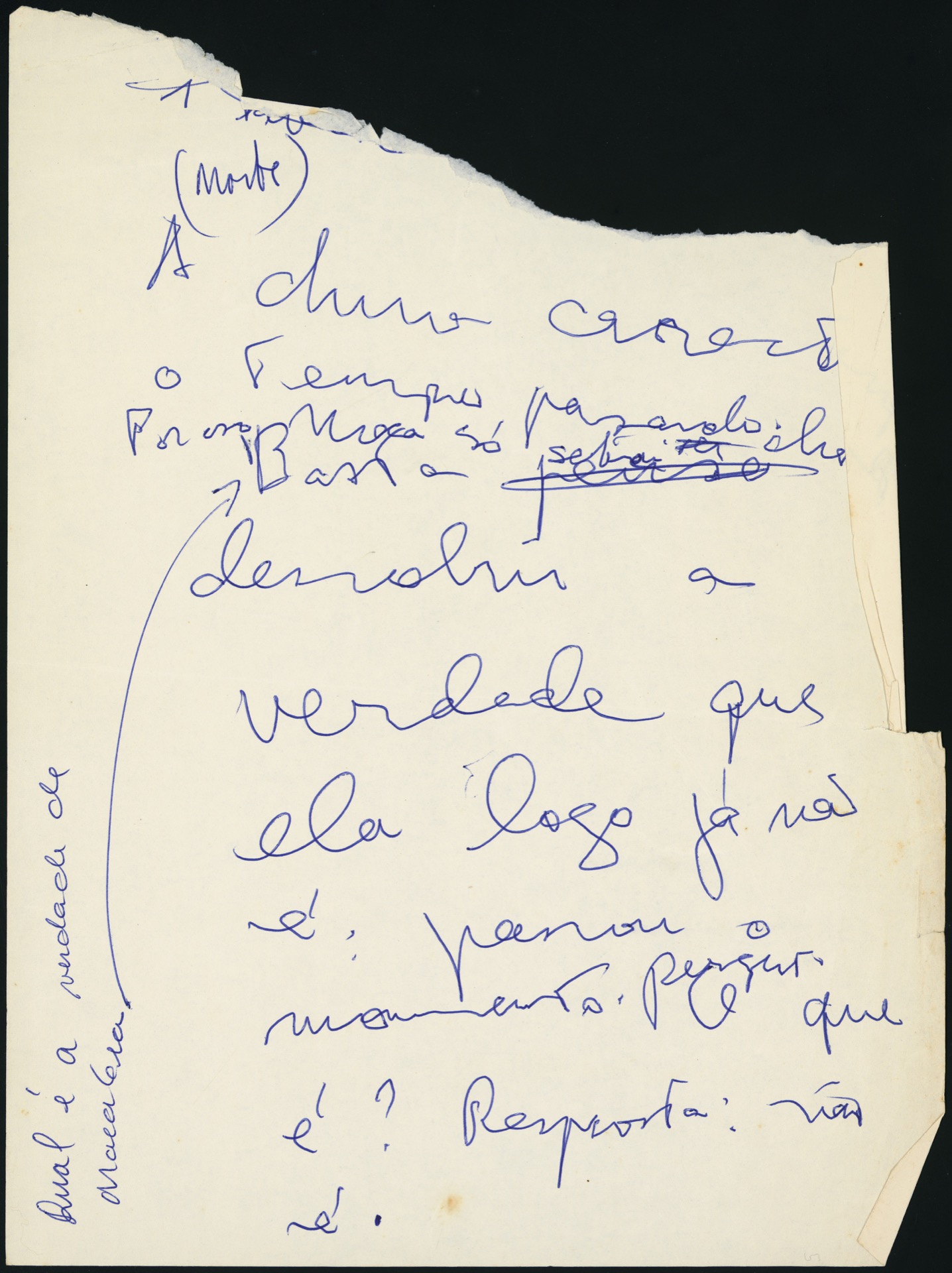
HEs05-020
“What was the truth of my Maca? As soon as you discover the truth it’s already gone: the moment passed. I ask: what is? Reply: it’s not.”
Note used in the 483rd paragraph of The Hour of the Star. The handwriting is by Clarice and by Olga Borelli (observation between parentheses, up high, and note below, on the left).

“But do not mourn the dead: they know what they are doing. I was in the land of the dead and after such black terror I resurged in pardon. I’m innocent! Don’t consume me! I am not saleable! Woe to me, all is lost and it’s as if the great guilt was mine. May they wash my hands and feet and then — then may they daub them with oils sacred from so much perfume. Ah such will for happiness. I’m now forcing myself to laugh in a great burst. But I don’t know why I’m not laughing. Death is an encounter with oneself. Lying there, she was a big as a dead horse. The best thing is still this: not to die, because dying is insufficient, it doesn’t complete me, I who need so much.”
Note used in the 484th paragraph of The Hour of the Star. The handwriting is by Olga Borelli.
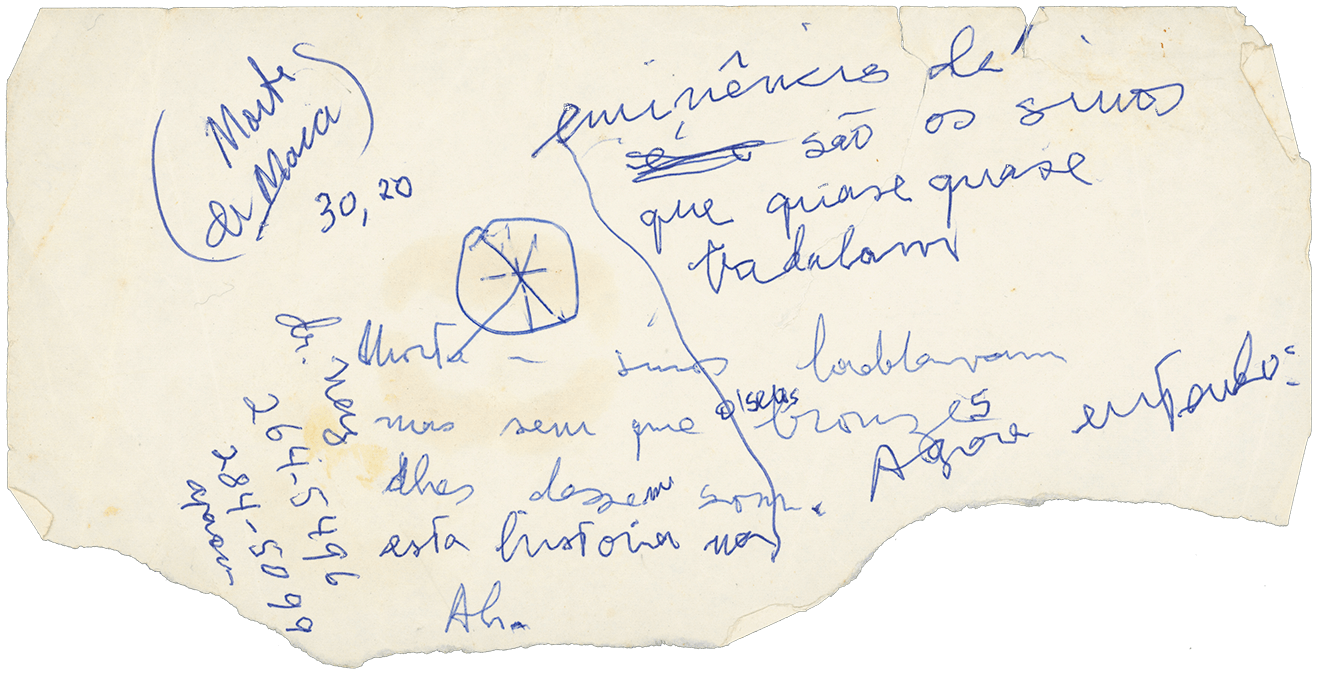
“With her dead, the bells were ringing but without their bronzes giving them sound. Now I understand this story. It is the imminence in those bells that almost-almost ring.”
Note used in the 488th paragraph of The Hour of the Star. The handwriting is by Clarice and by Olga Borelli (observation between parentheses, up high, on the left).
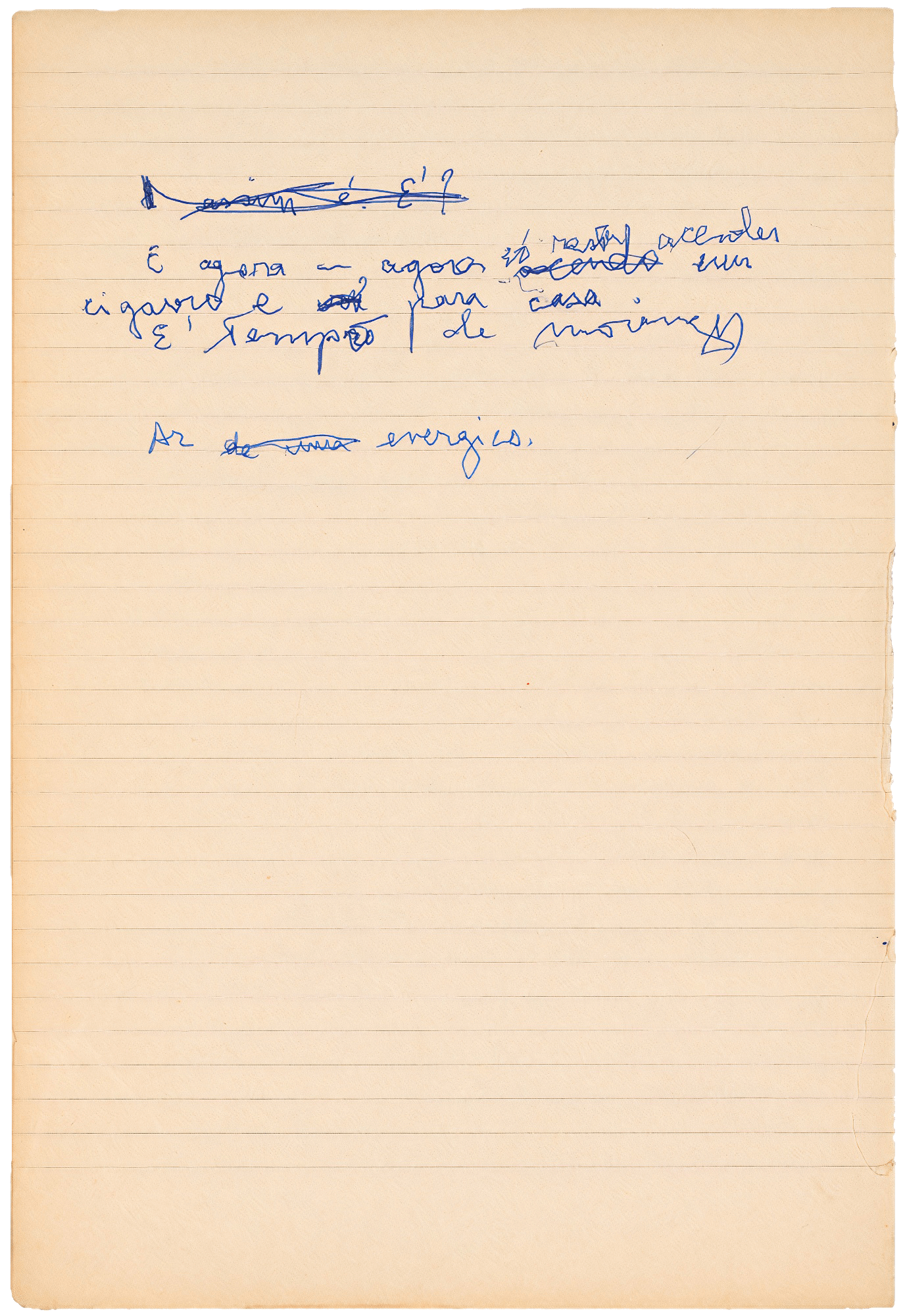
“And now — now all I can do is light a cigarette and go home. My God, I only remembered that we die. But – but me too?! Don’t forget that for now it is strawberries.”
Note used in the 495th and 496th paragraphs of The Hour of the Star. The handwriting is by Clarice.
Inspirations or notes?
In 2004, the manuscripts for Clarice Lispector’s novel The Hour of the Star arrived at the Moreira Salles Institute (IMS), important documents not only for their rarity, but also for documenting Clarice’s writing process. From the earliest works, the writer had adopted the method of immediate annotation. Thus, according to Nádia Battella Gotlib, her biographer, “she starts carrying a notebook, where she takes notes. It is from this large quantity of loose notes referring to the same subject that her novel will be constituted (…).”
Over time, notes are made on any type of paper easily at hand, and even by someone else whom Clarice asked for help when unable to write. Olga Borelli says that sometimes during a film session she wrote down an idea or phrase for the writer. She also says that Clarice, in the midst of domestic chores, would suddenly ask the maid to take notes for her. Thus, we see notes from The Hour of the Star on paper fragments, check sheets and envelopes. In addition to this diversity of supports, we also observe Olga’s handwriting in the majority of documents reproduced here, as she was the one who helped Clarice organize and type the manuscripts of The Hour of the Star.
In interviews, Clarice explained how her writing process took place in basically two stages:
When I’m writing something, I take notes anytime day or night, things that come to me. That’s called inspiration, right? Now, when I’m in the act of concatenating the inspirations, then I’m forced to work daily.
In the initial phase of writing, therefore, Clarice would write down “inspirations”, that is, ideas and phrases that came ready to her. When she reached a satisfactory volume of material, the writer would embark on the second stage of creation – she would concatenate the “inspirations”. If the first phase could take months or years, the next moment was uninterrupted work. In this manner the manuscripts of The Hour of the Star archived at IMS reflect Clarice’s stages of creation to the extent that these documents present both Clarice’s “inspirations” and more developed texts, products of that concatenation.
What we present in this catalogue are the “inspirations” harvested by Clarice for The Hour of the Star, which in the organization of the writer’s collection were given the technical term of notes. The pages of the catalogue, produced especially for this site, show reproductions of these notes containing information such as observations about differences of handwriting in the note and identification of notes taken by Olga Borelli.
Fabio Frohwein

